
- Homeschool 101
- Plan and Organize
- Grade Levels
- All Categories

42 Homeschool Field Trip Ideas + Planning Tips & Printable Log

Are you looking to get out of the field trip rut of zoo and science museum? This article has unique field trip ideas to add zest back into your day trips!
Not sure how to get started with field trips for preschoolers, how often to take field trips, how to plan them, or where to get a printable homeschool field trip log? This article has you covered!

Are field trips good for students?
Field trips are great for students! They are an extension of learning and one of the biggest perks of being a homeschooler. After all, how many field trips can a public school class have each year? Maybe two at best, right? They take an inordinate amount of planning for a school: boxed lunches, buses, permission forms, chaperones, etc. But as a homeschool family , you can pick up and go with much less preparation. In fact, many homeschoolers take a field trip nearly every week!
What are the benefits of a field trip?
Since you’re reading this article, you probably don’t need convincing, but here are eight concrete advantages that field trips offer your children (and you). Yes, they’re fun, and that’s reason enough! But they offer additional perks, too!
1. Real Life Learning Beyond the Books
Books are great! They are the foundation of the literature-based Sonlight curriculum . But there’s an entire world out there that can be experienced firsthand— beyond the books. While books make far off cultures and distant histories accessible to our children, there are many topics we can see, touch, and hear for ourselves either instead of (or in addition to) a book.
- So don’t only read about Native Americans. Visit an Indian mound museum and go deeper! Attend a public pow wow to observe and ask questions.
- Don’t just read about plant root systems. Visit a local nursery or botanical gardens and get pointers from the professional gardeners who serve there.
2. Socialization
One of the best parts of homeschooling is being able to open our front door and use our community as a classroom. So much for the stereotype of unsocialized homeschoolers ! No way! Homeschoolers are out and about in the community, going on field trips, and interacting with all kinds of people .
3. Motivation
Getting outside the house, exploring new places, and immersing yourself physically in a topic is an ideal way to erase monotony. When you find you’re falling into a boring rut with your homeschool schedule or attitudes are getting prickly, take a field trip! Mix things up! Take an adventure with your kids and experience the wonder of the larger world alongside them.
Field trips raise spirits, renew zest for learning, and give kids a break from the challenging tasks of pencil-to-paper work.
Field trips can be used as a culminating activity after a unit of study—a reward after a period of challenging academic work .

4. Retention
The more senses that are engaged when learning something, the more likely it is to be retained. Field trips are memorable , so kids tend to retain what they soak up on these outings.
5. Family Bonding
Field trips can smooth over the normal annoyances of homeschool family life. Instead of fussing about folding laundry, leave the chores and go explore the zoo! You’ll laugh at the antics of the animals instead of crying over math.
You and your children will create lasting memories of shared moments . When they are adults, these field trips (no matter how simple) are the things they will remember and cherish! So make more happy memories by taking more field trips.
6. Exercise
Many field trips involve quite a bit of walking. Some may even include climbing, leaping, and other physical exertion. In our tech-driven world, let’s not forget that we have bodies that need to move for optimum health! Field trips provide an ideal catalyst for meaningful movement .
Experiencing a sense of awe is a remedy to depression and anxiety. What a gift for our children, and one that we parents need as well!
God’s creation is amazing! So the potential for awe awaits you at any nature-focused field trip destination. Go! And then look, smell, listen, and feel. Let your senses absorb the wonder of God’s creation. The mindfulness and delight will lift your spirits !
8. Small Steps of Career Exploration
In some cases, a field trip gives kids a window into possible career fields. They can get a feel for workplaces and ask questions of the professionals who work there.
What are the disadvantages of a field trip?
The advantages of field trips practically negate the possible downsides, so don’t let these discourage you! But field trips can be a disruption to your normal routine (a feature , not a bug!).
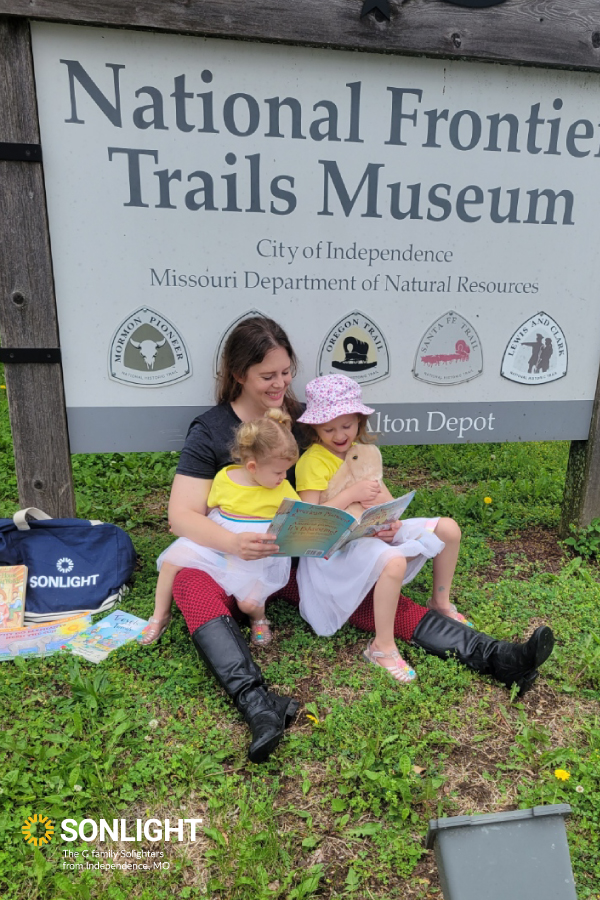
There are field trip logistics that can be possibly annoying: driving distance, parking, where to eat a picnic on premises, rough terrain that makes pushing a stroller a challenge, finding diaper changing facilities, etc. Again, pushing to find solutions is worth the benefit your family gets from the outing!
Some field trip destinations can be pricey, but free homeschool field trips exist! Be sure to ask your desired venues about family passes, special discount days, or community events that are free of charge. Alternate free homeschool field trips with paid field trips to keep costs low, and carpool with another homeschool family to save on gas. Skip the gift shop and take a picnic instead of eating at the kiosks. There are ways to make field trips doable even with a tiny budget.
Bad weather can ruin an outside field trip, but you have the flexibility to move that trip to a prettier day!
There aren’t really any disadvantages inherent in field trips for homeschoolers. But there are small irritations of life that come along with any kind of day trip.
What are good field trip ideas?
The sky's the limit, but here are forty-two suggestions to get you started with homeschool field trips for all ages and grades. Start with lower cost local field trips, and then expand out to more distant destinations as your children mature.
- theater, opera, or ballet performances
- local house of worship, especially of a faith that is not your own (Muslim mosque, Hindu temple, Jewish synagogue, Greek Orthodox church, etc.)
- factories (like a bakery or an automotive factory)
- fish hatchery
- orchard, farm, or farmers market
- local power plant
- bike trails, hiking trails, or river canoeing
- space centers
- water treatment facility
- cemetery tours
- city capitol or state capitol, including the courthouse
- historic landmarks like battlefields or birthplace museums (think famous artists, musicians, athletes, writers, presidents, etc.)
- archaeological dig
- fire station, ambulance, or police station
- the post office
- historic reenactments
- Native American pow wows
- festivals
- county fairs
- science museums
- college tours
- science lab tours (could be industry or educational)
- planetarium
- observatory
- dams and bridges
- arboretum, botanic gardens, or greenhouse
- aquarium, zoo, or wild animal park
- local or county parks
- state parks and forests
- national parks
- recycling center
- animal shelter or veterinarian’s office
- food bank, homeless shelter, or other charity organization
- semi-professional sporting events
- amusement parks
- military bases
- TV station or radio station
- music recording studios
What are the types of field trips?
The weather will influence your choice between indoor field trips and outdoor field trip s. Your budget impacts your decision between free field trips and trips that cost money.
And your own preferences for planning will affect whether you go for easy field trips or those that take more advance preparation. For example, venues like zoos, galleries, and museums are already optimized for easy field trips. But there are a myriad of other locales that can make for a great field trip when you connect with someone who can arrange it for you—think local newspaper, the fire station, a historic house of worship, or a local factory.
There are local field trips and more distant trips . Typically a field trip is a day trip —you return home the same day and sleep in your own bed.
Free Family Travel Guides from Sonlight
But some field trips expand into complete family vacations like these two East Coast destinations for American history buffs.
A Family Travel Guide to Historic Williamsburg

One ticket. Five parks. Seven days. An unforgettable trip. Virginia is home to some of the greatest historical landmarks of colonial America. The Historic Triangle provides a peek into America's journey from English settlement to the independence of a new nation. When you are ready to visit, make the most of your time with these practical, tried-and-true tips.
Navigating Thomas Jefferson's Monticello
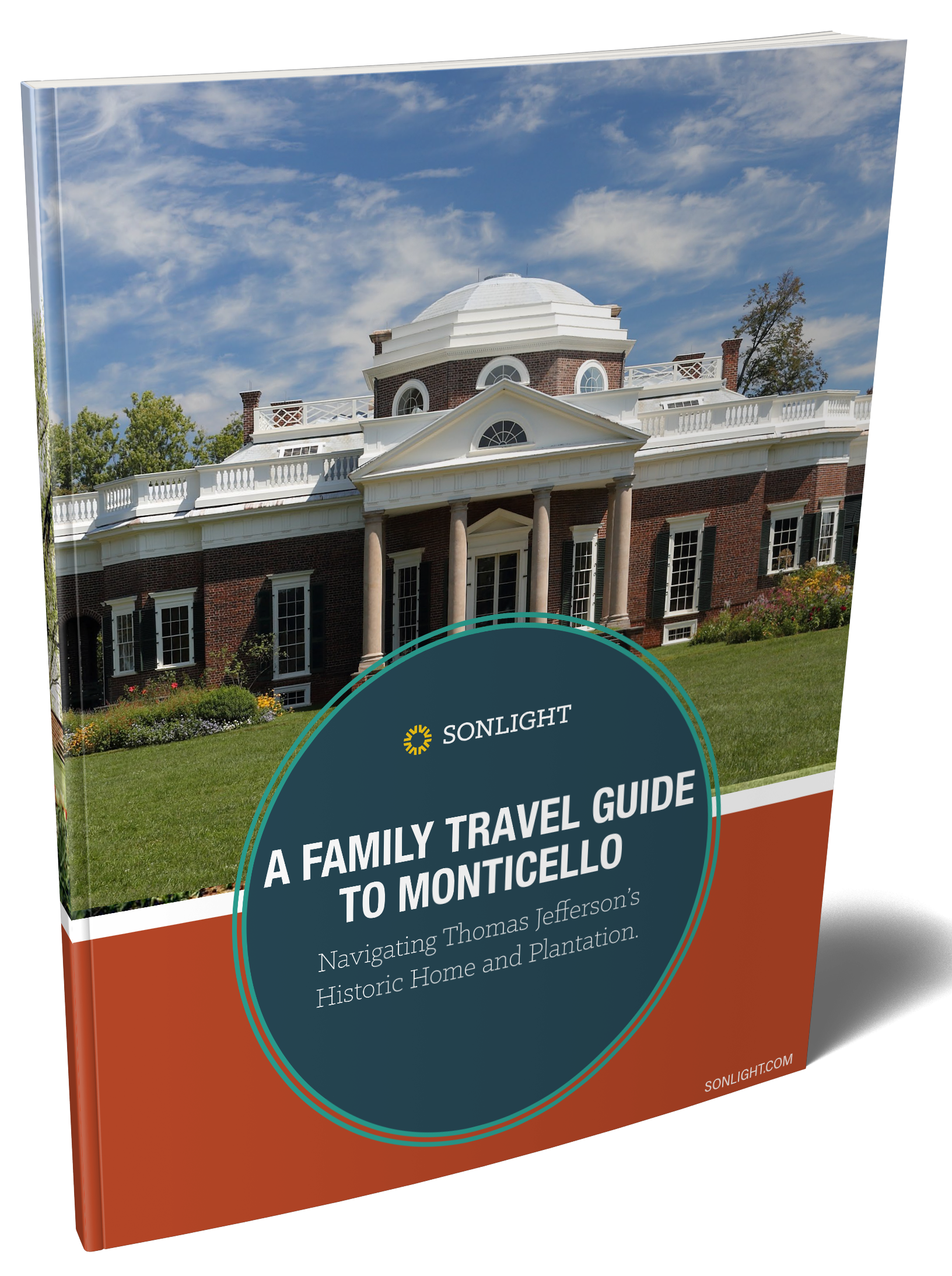
Enjoy a day or a long weekend exploring Monticello and the surrounding area. Visiting this estate can be a wonderful addition as you study American History. Download this full-color free digital travel guide today to help you navigate Monticello and all the additional historical locations surrounding Monticello.
What are the most popular field trips?
The most popular homeschool field trips are those locations that are already set up for large groups with ample parking, pre-designed tours, clearly defined hours, and even amenities like picnic areas or shuttles/trains.
These family pleasers have rotating exhibits or frequent workshops/events that deliberately cater to homeschool families. Examples are
- nature preserves
- botanic gardens
- art galleries
- history museums
- historic sites
- and national or state parks
These locales are typically large and well-established. Visit their websites to see what they offer. Sign up for their email newsletters so you’re always in the know about special events, bargain days, and new exhibits.
Field Trip Planning, Preparation, and Printables
Some field trippers spontaneously jump in the car and head off for an unscripted adventure. But most moms probably prefer to set the stage with some basic groundwork. In fact, field trip planning can be part of your annual curriculum shopping as you lay out a course for your school year.
Free printable homeschool field trip log
A homeschool field trip log can pull double duty as a place to record your plans beforehand and/or a place to document the trips you took afterwards. If you’re required to keep a homeschool portfolio or verify a certain number of school days, a homeschool field trip log is essential! (Don’t rely on your memory alone. Record those field trips!)
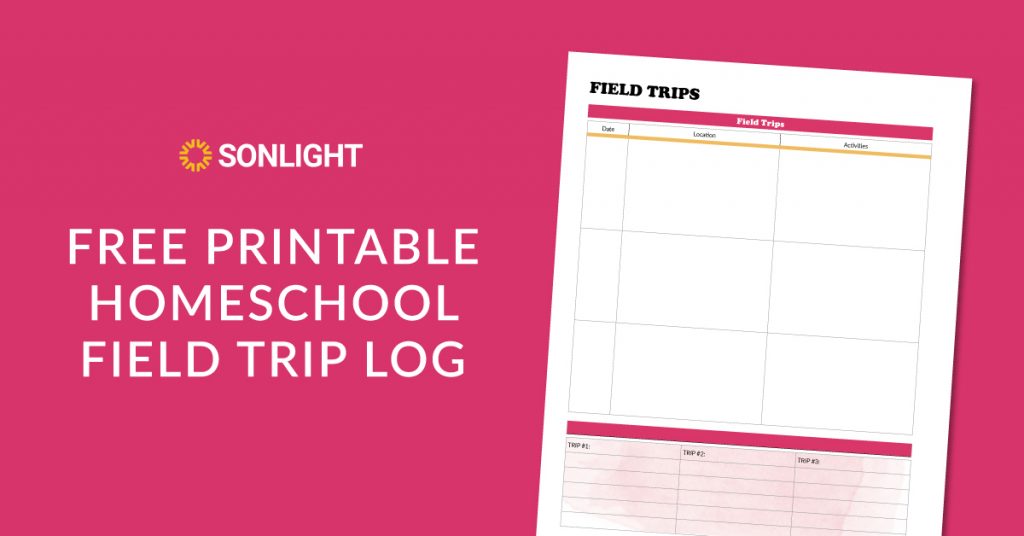
Download a free homeschool field trip form here to use as you work through the seven steps below.
(This free page is taken from the larger Sonlight Planner .)
PRO TIP : Print multiple copies (or sets)—one for planning and one for recordkeeping.
How do you plan an educational field trip?
For those of you who like to plan ahead, here are seven steps for making a comprehensive field trip plan for your homeschool.
1. Brainstorm fun homeschool field trip ideas
This is the fun part! Looking at the list of 42 suggestions above, jot down the ones that seem appealing to you and your children.
Alternatively, consider your curriculum . What are you studying this term or year? What field trips can you plan to go along with the science and history topics you’ll be covering? What Readers and Read-Alouds have field trip tie-ins?
Don’t rule out field trips for teens! Advanced courses mesh well with learning excursions! Here are some examples:
- Biology field trip ideas : a butterfly vivarium, an Audubon Center , a wolf preserve
- Chemistry field trip ideas : a manufacturing laboratory, a college research lab, fire department, wastewater treatment plant
2. Look for specific locations
Head to Google and input your desired type of field trip. For example, when you search TV station tour , your local station will likely pop up with contact information to get started! Or search for planetariums near me . Yelp and Tripadvisor are two great apps for reading user reviews of many field trip destinations.
3. Outline the logistics
Once you have specific venues in mind, start charting out the details like hours of operation, ticket costs, special tours/exhibits/workshops, etc.
4. Contact the specific venue for insider information
Don’t be nervous to send an email or pick up the phone to inquire about details. Even established venues like museums and zoos may be able to offer you special accommodations or workshops as long as you let them know you’re coming.
Directly ask for insider tips: “Is there anything else that I should know before we come? Anything that’s not on the website?”
5. Make a field trip calendar for the year
Now you have the information you need to start filling out an annual field trip calendar. Pencil in your ideas based on your curriculum , the weather, and other family events. It’s common to have a monthly field trip, but you may want excursions more or less frequently.
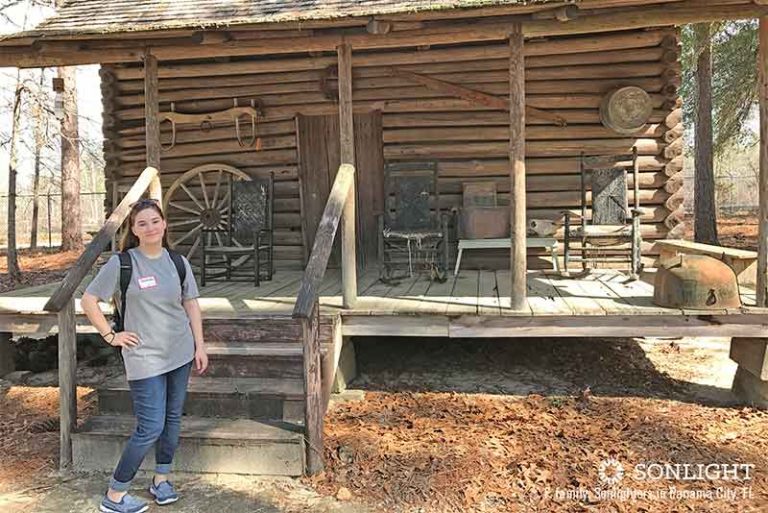
6. Consider providing structure to the trip—or not!
There are different approaches to taking a field trip. Some families drop all the academics and simply enjoy the experience, letting the fun unfold naturally.
Other families read about the place beforehand and assign homeschool field trip activities . These activities provide structure to the trip by giving kids a task to focus their exploration:
- a worksheet to fill out
- a journal for sketching
- a scavenger hunt
If your children tend to race through an exhibit without truly appreciating anything, an on-site assignment can help slow them down and center their attention on key facts.
Check with the venue ahead of time because many of them already offer these activities either in hardcopy when you enter the destination or in digital format for you to print at home.
P RO TIP : If you expect your child to do a written activity at the field trip, bring clipboards or bring homeschool field trip journals with a cardboard backing.
There’s no right or wrong here, but realize that you don’t have to add anything school-ish to justify a field trip. It’s enough to simply soak in great works of art or wander around an arboretum. Your kids are learning!
7. Consider review or documentation—or not!
Once you’re back home, you may want to document the trip or review what you experienced. Again, this step is optional and doesn’t have to be formal or burdensome.
How to write a homeschool field trip report
For upper elementary ages, middle schoolers, and high schoolers, it’s appropriate to assign a written project. This homeschool field trip report can take the format of a notebooking page, a journal entry, a scrapbook page , or a short composition.
Here are the basics to include in a field trip report:
- the date of the trip
- the full name and address/location of the destination
- the significance of the location (if historic)
- the primary places/exhibits/topics that were experienced along with a brief description of each
- insights, opinions, and reflections
Add these extras to add to the field trip report to make it more of a homeschool field trip journal:
- diagrams and sketches made at the venue
- photographs or postcards
- actual items from the site (where allowed, of course) such as leaves, moss, feathers, etc.
You could help your kids write a review of the location to post on Google, Yelp, or Tripadvisor.
Or maybe you simply have a discussion about what you experienced. Here are a few discussion starters:
- What was your favorite part of today? Why?
- What surprised you today?
- If we do that field trip again, what would you like to spend more time doing?
- Tell me 3 facts about [topic, person, place].
- Imagine you have to convince someone to go on a field trip to that place. What would you say to them?
- Quiz me/your sibling by asking me three questions I should have the answer to after our field trip today.
What to carry with you on a field trip?
If you’re not sure what to take along on your field trip, call the venue and ask! Find out what kinds of amenities they offer and what they suggest.
Aside from that, you already know the basics: snacks, wipes, a few adhesive bandages, drinking water, sunscreen, hats, etc.

Unique field trip ideas
Because field trips have the potential to be so powerful, and because we have such an abundance of resources in our communities, it’s important to think beyond the norm to get our kids—and ourselves—out there, gaining fresh experiences and better understanding. Nearly any place that’s not unsafe for kids has the potential to be a field trip destination.
Any process, any job, any business has fascinating aspects to uncover on a family field trip for homeschool. Simply drive around your community with an open mind. Nearly every business you see is potential fodder for a field trip!
- That locally owned coffee shop? Yep!
- The beauty parlor? Why not?
- The dentist’s office. For sure.
- That manufacturing plant? Probably!
Start with your connections. Ask friends about their place of work, their family businesses, their connections. Having a contact smooths the path to set up a family tour and an unlikely field trip destination. Most folks are thrilled to show off what they do to a handful of kids (and an interested parent). So don’t be afraid to ask!
Your community is full of experiences, and those experiences can easily be tied to your curriculum. Here are four examples to get you started with fun homeschool field trip ideas:
1. Small Engine Repair Shop Field Trip
Kids (and adults) of all ages will be fascinated to see what goes into maintaining and repairing the many machines we use every day. Lawnmowers, chainsaws, generators, and scooters all fall under the small engine category.
The history of these machines is intriguing, and it’s a great introduction to more complex engines, too! This field trip ties in nicely with any of these books (or programs):
- Richard Scarry’s What Do People Do All Day
- Sonlight’s Science H- Technology
- A History of US
- The Story of Eli Whitney
2. General Aviation Airport Field Trip
Even better than flying on a commercial airliner is the experience of walking and talking with the pilot of a General Aviation (GA) plane. These smaller models operate under the same principles, and are in much wider use than the jumbo jets we board to fly cross country. You may be able to arrange to tour the actual facility or even take a short flight! If you’re reading these books, a field trip to an airport fits well:
- The Wright Brothers
- Around the World in 80 Days
- Catching Their Talk in a Box
3. Ethnic Food Market Field Trip
Pick a country, and find a shop! From the delicacies of Asia to the exotic (to us) foods of the Middle East, chances are excellent that you’ll have a market hidden somewhere in your community that specializes in foods of other lands. While you can order individual items online, nothing beats walking the aisles, smelling the smells, and seeing what’s on offer on the shelves.
There are so many Sonlight books that tie in to this field trip, but I’d be remiss if I didn’t point out that HBL F: Eastern Hemisphere is crying out for a whole year of such outings!
4. Radio Station Field Trip
If you’re reading Catching Their Talk in a Box or Window on the World , or your child is studying physics, definitely make time for a trip to a local radio station . Choosing a smaller, local station to tour means the chance to walk into booths and likely get an up close and personal glance of the inner workings of a broadcast in progress. Missionaries of the past and present have utilized radio as an evangelism tool, and the science behind it is fascinating.
Where to get the best homeschool field trip ideas
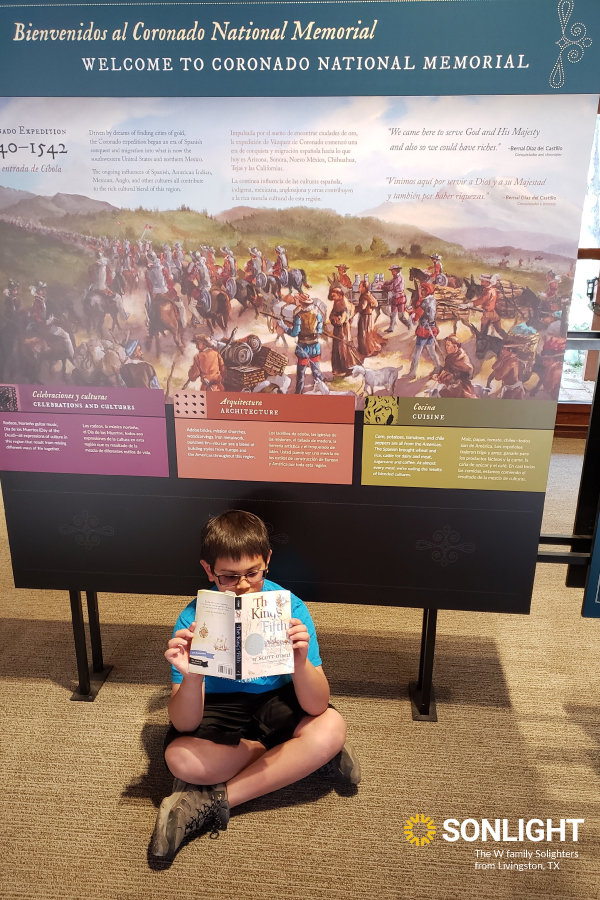
Need inspiration for field trip ideas for kids? Marry books and field trips as often as you can to cultivate an adventurous learning environment. Here are examples:
- Visit an aquarium after Dolphin Adventure .
- Tour an art museum after From the Mixed-Up Files of Mrs. Basil E. Frankweiler .
- Trek to a farm after Mountain Born , Thimble Summer , or The Year at Maple Hill Farm .
Getting out and seeing firsthand the elements of a story or work of nonfiction cements it in our understanding. Not only do children hear how the mail system works in Richard Scarry’s What Do People Do All Day , but then they see it in action when they visit the post office. All the senses are engaged!
The details that may have escaped them in the book are suddenly prominent and yes, maybe even a door is opened to a new occupational calling. You just never know!
Suggested Field Trips by Age
The list of 42 ideas above are for all ages, stages, and grades, but admittedly some destinations are more suitable for younger or older students. Here’s how to work out your field trip decisions based on ages or grades.
Field trips for toddlers & preschoolers
Since toddlers and preschoolers are probably still napping, you want local field trip ideas that won’t require lots of driving. Thanks to the mid-day pause for nap time, you’ll choose trips that can be done in the morning or afternoon but don’t demand a full day.
Avoid stodgy venues where quiet is expected and children can’t touch things. Instead opt for field trips with lots of hands-on, active exploration and frequently changing things to observe.
Your best bets are anything related to animals:
- animal shelters and preserves
- butterfly gardens
Or any venue that has a nature or science slant:
- children’s museum
- arboretum or botanic gardens
- science museum
Call ahead or scour the website to find programs or exhibits especially designed for very young children to touch and physically experience the content.
Children at this age are still developing vocabulary, so exposing them to new experiences and talking about what you see is invaluable.
Outdoor or large open spaces where it’s okay to run are ideal for little kids. And you’ll want to consider field trip spots where strollers can drive easily when little legs finally tire.
Keep field trips short in duration and leave while everyone is still happy!

Homeschool kindergarten field trip list
Although some parents consider kindergarten their first year of formal schooling , there’s no need to restrict yourself to learning at the kitchen table with books, pencil, and paper. Field trips are rich learning experiences for 5-year-olds since so much of the world is brand new to them!
During grades K-2, think of field trips as opportunities to expose your child to the larger world and don’t worry about retention or academic tie-ins. Just get out there and immerse yourself in the joy and awe of all the field trip options in your local area.
Save the elaborate, far-off destinations for later years when your child has more maturity and physical stamina. At the kindergarten through second grade level, you’re still enjoying repeat visits to the places you frequented during the toddler and preschool years:

Now your visits may last a bit longer (no need for that daily nap!) and may include more actual academic material. For example, you may stand and listen to a zoologist give a short talk or show your child key facts on a display board.
You’ll want field trips at this stage to still be very tangible. For example, touring a cave where a child can touch the damp stone, smell the wet air, and hear water dripping is more age appropriate than an opera, a tour of a house of worship, visiting the county courthouse, or a science lab excursion where the experience is more abstract or passive.
Opt for trips where you can get your kindergartener involved:
- picking strawberries at a farm
- making gravestone rubbings in a cemetery
- making a sculpture in a special kids room at the art museum
How often should you do field trips in kindergarten homeschool? As often as you and your kindergartener would like to! Aim for at least monthly at this age, giving yourself a few mulligans to skip a month here or there depending on other family dynamics, health concerns, etc. Your kindergarten field trips could be as often as weekly if your family is up to it!
Field trip ideas for elementary students
Grades 3-5 are a sweet spot for homeschool field trips! These children have the physical stamina for full day trips and are growing in the mental maturity to appreciate more abstract types of experiences. They generally have the self-control not to touch what shouldn’t be touched. They are curious and can ask great questions of docents and guides. You’ll see children at this stage start to make connections between their book-based lessons and what they experience on field trips.
So basically, anything from the 42-item list above that interests your elementary students is fair game! Even if some of the content goes over their heads, it’s still exposure to new ideas! If a field trip seems a bit too advanced for your elementary student, just cut it short or inject additional context to make it more understandable for them.
Virtual field trips for homeschoolers
What can you do instead of field trips? The pandemic has taught us all the value (and yes, limitations ) of virtual experiences as a substitute for in-person events. Sometimes a field trip is simply out of reach. In those situations, turn to virtual field trips to meet the need.
How does a virtual field trip work?
With a virtual field trip, you use the magic of the internet to explore a place you can’t visit in person. You rely on live cams, 360° virtual tours, virtual reality tours, and even live online video conferencing sessions held on-site.
If these tools are new to you, here are fun homeschool field trip ideas that are totally online:
- Old Faithful Geyser live webcam
- The giraffe cam at the San Diego Zoo
- The Louvre online tour
- National Museum of Natural History virtual tours
- California State Parks Home Learning Programs
- Center for Interactive Learning and Collaboration programs
What are the best virtual field trips for students?
Large and well-known zoos, science museums, art galleries, and history museums make for the best virtual field trips simply because they tend to have top-notch websites with the video tours and live webcams you’ll want to access. State and national park systems are good options as well. Smaller venues, while fascinating in person, often don’t have the digital resources to provide a great virtual field trip experience to online users.
Here’s a list of virtual field trip favorites:
- Virtual Tour of the Great Wall of China
- San Diego Zoo
- Mars (via NASA)
- Monterey Bay Aquarium live cams
- Farm Food 360
- Boston Children’s Museum virtual tour
- Paris Catacombs virtual visit
- The Vatican virtual tour
- Virtual tours: Buckingham Palace
- Anne Frank House
- The White House 360 virtual tour
- Virtual Field Trip to the Butterfly Conservatory
- Metropolitan Museum interactive map
How do I create a virtual field trip for students?
1. Choose a website (or a series of related ones).
The education departments of zoos, museums, and parks strive to make their facilities accessible to the maximum number of users, so scan their websites first for all the resources they have to offer: curriculum, printables, videos, virtual tours, live web cams, live and recorded workshops, lesson plans, etc.
2. Set your child loose on the website to freely explore.
You will likely want to be nearby to enjoy the discovery process alongside them.
3. Or give your child an activity to do while exploring.
This step is totally optional. But if you feel the need to document the learning , there are plenty of ways to do it! Provide more structure with printables, worksheets, scavenger hunts, or notebooking pages.

Choose a curriculum that does the planning for you so you can spend more time on field trips with your kids.
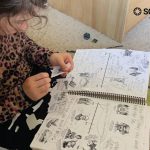
5 Benefits to Using a Timeline in Your Homeschool

Favorite Kids Books Also Made Into Movies: Fun Homeschool Study Ideas
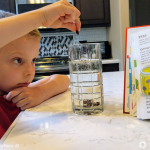
Summer Camp at Home: A DIY Guide for Homeschoolers
Leave a Comment Cancel reply
Your email address will not be published. Required fields are marked *

Most Popular
Article categories.
- Back to School
- Encouragement
- High School
- Middle School
- Homeschool Basics
- Planning, Organizing, and Scheduling
- Reading and Literature
- Sarita's Word
- Scholarship Winners
- Sonlight Spotlight
- Special Needs
- Summer Learning
- Uncategorized
- Where Are They Now
#sonlightstories
Love to learn, love to teach™
8042 South Grant Way Littleton, CO 80122 USA
1-800-903-1675

Homeschool Days
Programs for grades k to 12.
Homeschool Days are available the first Monday of the month from October through June. We offer in-person, standards-aligned programs designed for Grades K to 12.
In-Person Q?rius Homeschool Days
Designed to accommodate individual students or small groups with less than 15 students. Programs take place at the Smithsonian’s National Museum of Natural History in Q?rius, The Coralyn W. Whitney Science Education Center . All programs are free, but registration is required.
Homeschool Days: Frequently Asked Questions
Online Homeschool Day Zoom Webinars
Designed to accommodate individual students or small groups with less than 15 students. Students will not be visible to the museum educator or other students, but they will be able submit questions in writing through the Q&A, and interact through polls. Homeschool Days are available the first Monday of the month, April 1, May 6, and June 3, 2024.
Programs by Date
Get information, times, and registration links. Registration for spring 2024 will open on Monday, March 11 at 9:00 a.m. ET. Please review the "Homeschools Days: Frequently Asked Questions" document prior to registration. (See download link above.)
Monday, April 1, 2024
PROGRAMS ON APRIL 1, 2024
GRADES K TO 2 Animal Adaptations 10:15 a.m. – 11:15 a.m. ET Discover how animals adapt to their environment by looking closely and making observations of animal specimens from the Museum’s collections. Students use observations and background knowledge to make inferences about how those adaptations help the animal to survive in its environment. Register for this in-person program
GRADES 3 TO 5 Identifying Minerals 11:45 a.m. – 12:45 p.m. ET What is a mineral? During this museum educator-led program, students will identify a variety of minerals by testing their luster, streak, hardness, color, and magnetism. Register for this in-person program
GRADES 6 TO 12 Collections Challenge 10:15 – 11:30 a.m. and 11:45 a.m. – 1 p.m. ET The Q?rius Collections Zone includes 6,000 natural history objects, all accessible for student exploration in this staff-led program. Working in teams, students will receive a Collections Challenge Card, which assigns them to work in one of the Museum’s departments: Anthropology, Botany, Entomology, Invertebrate Zoology, Paleobiology, Mineral Sciences, or Vertebrate Zoology. Like scientists and collections managers at the Museum, students will follow protocols for handling valuable and sometimes delicate objects, and agree upon a strategy to curate and interpret a collection of their own while engaging in the scientific method. Register for this in-person program at 10:15 a.m. | Register for 11:45 a.m.
GRADES K TO 2 Animal Adaptations 10:15 – 11:00 a.m. ET During this museum educator-led program, students compare and contrast animal specimens from our virtual collections to discover how different adaptations help animals survive in their habitat. Students will explore the different kinds of adaptations for animals who live on land, water, and in the air. Register for this online program
GRADES 3 TO 5 Insect Illustration 11:45 a.m. – 12:30 p.m. ET Did you know that insects have more species and live in more places than any other animal? During this museum educator-led program, students virtually explore what makes an insect and why they are so successful. Through the scientific skills of observation and illustration, students will investigate and identify the survival techniques of one extraordinary insect, the Tobacco Hornworm. Register for this online program
GRADES 6 TO 12 Reefs Unleashed 1:15 – 2:15 p.m. ET During this museum educator-led program, students explore biodiversity on a coral reef using the same methods as Smithsonian scientists. Students will practice science skills of observing, classifying, and quantifying organisms living on coral reefs using real data collected by field scientists with Autonomous Reef Monitoring Structures (ARMS). They will use their observations to understand how biodiversity is related to ecosystem resilience, and how humans are impacting these vital ocean habitats. Register for this online program
Monday, May 6, 2024
PROGRAMS ON MAY 6, 2024
GRADES K TO 2 Classifying Shells 10:15 – 11:15 a.m. ET Students will observe, describe, compare, contrast, and sort a variety of shells to sharpen their classification skills and strategies in this museum educator-led program. Register for this in-person program
GRADES 3 TO 5 Insect Survival 11:45 a.m. – 12:45 p.m. ET During this museum educator-led program, students practice scientific skills and explore the survival strategies of insects. Students identify survival techniques such as camouflage, mimicry, biting, stinging and flying. Register for this in-person program
GRADES 6 TO 12 Bird Strike 10:15 – 11:30 a.m. ET and 11:45 a.m. – 1 p.m. ET During takeoff from Reagan National Airport, a plane collided with a flock of birds and was forced to make an emergency landing. During this museum educator-led program, students follow in the footsteps of Smithsonian scientists to determine the species of bird that brought down the airplane by examining bird fragments and feathers collected from the affected aircraft and simulating processing DNA. Students will learn how bird strike data is used by airport managers to alter airfield habitats and debate proposed methods of discouraging bird congregation around airports. Register for this in-person program at 10:15 a.m. | Register for 11:45 a.m.
GRADES K-2 Discovering Dinosaurs 11:45 a.m. – 12:30 p.m. ET During this museum educator-led program, students will make observations of dinosaur characteristics, discover how paleontologists learn about ancient animals by studying fossils, and practice some of the same scientific skills used by museum scientists! Register for this online program
GRADES 3-5 Urban Habitats 1:15 – 2:00 p.m. ET During this museum educator-led program, students will become sidewalk naturalists and meet both iconic and underappreciated plant and animal residents of the nation’s capital. We will discover how organisms survive and thrive in urban environments while we practice field ecology skills and reflect on the ways in which our cities are part of the natural world. Register for this online program
GRADES 6-12 Hot Potato: Climate Change, Food Systems, and You 10:15 – 11:15 a.m. ET During this museum educator-led program, students will investigate the connections between their lives and climate change through the lens of food! This interactive virtual program offers an opportunity to explore agricultural systems, review data, and learn about the relationship between climate change and potatoes. Together we will examine how scientists study food as a natural resource, and explore some innovative solutions that can have a positive impact on long-term food sustainability. Register for this online program
Monday, June 3, 2024
PROGRAMS ON JUNE 3, 2024
GRADES K TO 2 Discovering Dinosaurs 10:15 – 11:15 p.m. ET During this museum educator-led program, students will make observations of dinosaur characteristics, discover how paleontologists learn about ancient animals by studying fossils, and practice some of the same scientific skills used by museum scientists! Register for this in-person program
GRADES 3 TO 5 Marine Ecosystems – Pilot Program 11:45 a.m. – 12:45 p.m. ET During this museum educator-led program, students take on the role of a school of Pacific Salmon in a role-playing game through the anadromous life cycle of salmon. Each play of the game introduces new interactions and relationships between organisms helping students examine how matter and energy flow through connected marine ecosystems. Register for this in-person program
GRADES 6 TO 12 Exploded Cellphone - Pilot Program 10:15 – 11:30 a.m. ET and 11:45 a.m. – 1 p.m. ET If you could look inside your cellphone, what would you find? In this brand-new, museum educator-led program students will take on the role of anthropologists and think critically about the materials, makers, and processes that make up these everyday devices. Students will make connections to geology, chemistry, technology, culture, and more as they work in groups to take apart a phone and investigate the unseen connections between this common device and the natural world. Register for this in-person program at 10:15 a.m. | Register for 11:45 a.m.
GRADES K-2 Budding Botanists 1:15 – 2:00 p.m. ET During this museum educator-led program, students will practice science skills by identifying patterns to help them classify and group plants like the museum’s botanists. Through the use of real digital collections, including specimens from the National Herbarium, students will explore why it is important to collect and study plants. Register for this online program
GRADES 3-5 Rocks and Minerals 10:15 – 11:00 a.m. ET During this museum educator-led program, students will gain a better understanding of rocks and minerals, their uses, and how they are formed. Join us for an immersive exploration of some of Earth’s treasures in the Hall of Geology, Gems, and Minerals while using problem-solving skills to unlock the mysteries of these unique museum specimens. Register for this online program
GRADES 6-12 Human Origins: What does it mean to be human? 11:45 a.m. – 12:45 ET During this museum educator-led program, students will explore what it means to be human through an investigation of Turkana Boy, a 1.6 million year old fossil hominin from Kenya. By examining virtual museum collections, students will gain a better understanding of paleoanthropology, human evolution, and how scientists reconstruct human prehistory. Register for this online program
Contact School Programs at [email protected] .
- Smithsonian Institution
- Terms of Use
- Privacy Policy
- Host an Event
- Our Mission
Home Visits: Reaching Beyond the Classroom
Get to know your students and strengthen the home-school partnership with these seven tips for reaching out to parents and meeting families.

As a teacher at a small Oakland, California public high school called Life Academy , where each teacher also holds a mixed-grade level advisory class of about 20 students, I began conducting home visits for my advisees as a way to clarify my relationship to them as more than a teacher. After all, we would be together for the next four years. I would be their advocate when they struggled in other classes, the one who would write their letters of recommendation, announce them at graduation, and ask them about their day, every day. Part of this relationship was an initial visit to each student's home.
Seeking Home-School Partnership
To make home visits manageable, I only visited the homes of the four to five ninth graders who were new to my advisory class. The first year I did this, there was a lot of pushback from students who weren't used to having a teacher visit their home, but in the second year, the tenth graders were able to sell the idea for me. They'd say, "Yeah, she came to our house, too. It was cool!"
Once there was buy-in from the class, the home visits were relatively easy to set up. The student would check with their parent and find a good time for me to stop by. Often the parents were relieved to hear that they didn't have to get off work early or find time to come to me. In fact, some of my students' parents began to request home visits, and I happily obliged. I always gave myself a full hour, but rarely needed it. I visited homes after school, in the evening, or on the weekend, whatever was best for the family. While I've heard the advice to conduct home visits with a partner teacher, I personally felt that going alone made it more comfortable for the family.
One time, when I was visiting the home of soccer star Angela, her mom had prepared a full meal for me, and the visit lasted well into the evening when she invited me into the back yard to pick lemons for my own family. After that visit, despite the language gap (I am proficient but not fluent in Spanish), whenever I saw Angela's mom at school events or at on-campus parent conferences, it was more like seeing an old friend. We were comfortable with each other. She felt accepted by me, and I felt respected by her. We were partners in her daughter's education.
Of course, it didn't always go so idyllically. Once I visited the home of Payton, whose mom was volatile and even hostile in meetings. I had met her several times before the home visit because Payton was in trouble at school early and often. At his house, I was formally welcomed but felt out of place as we sat in the living room and his numerous brothers clamored for his mother's attention. His mom told me about how three of Payton’s male role models had been killed in the last few years. I was glad to have had a glimpse at his home life, even though its reality made me feel more powerless than before. I imagined that as out of place as I felt in his mother's home, she must also feel the same way when visiting the school. If nothing else, the visit allowed me to empathize more clearly with Payton and his family.
The Power of a Visit
Whenever I coach new teachers, I encourage them to visit the homes of students as early as possible. It's just about the quickest way to understand a student better. Home visits should also be considered when a student is new to a school due to a transfer. While I made it a personal policy to visit the homes of all my ninth grade advisees, I also recognized that the impact of home visits could have been multiplied had it been a school-wide practice. Can you imagine if every ninth grader got a visit from his or her advisor, and if each family felt personally welcomed to the school? At my school, we've made time for on-campus parent conferences by modifying our schedules, but we haven't yet prioritized home visits. I think meeting parents and guardians where they are most comfortable could make a big difference. It certainly did for Louise Rocha-McCarthy and Annie Huynh .
In my own experience, visiting my student Diego at his house when he had been out of school for several weeks is what got him to come back to school, albeit briefly. I saw the power of home visits again this year when one of our most challenging students had missed several weeks of school. An email chain revealed that no one had been able to reach the family to find out why he had been away. Students were starting to ask where he was and why none of his teachers knew the answer. That very afternoon, three of his after-school mentors went together to his home and by the next day he was back in class. While the visit clearly had a positive impact on the young man, this impact rippled throughout school, too. Students saw without a doubt that the adults at school, not just classroom teachers, cared for even the most troubled student, and that being absent didn’t mean being invisible.
7 Suggestions for Visiting
Here are a few tips to get the most out of your home visit:
- Make home visits a part of your classroom or school culture so that no one feels singled out.
- Systematize who gets home visits to keep the practice manageable for you.
- Set aside strategic times during the year for home visits.
- Be flexible about when you do a home visit. Let the parent or guardian decide the date and time.
- Be prepared to share one concrete example of a way that you've seen the student shine.
- Don't discuss grades or behavior. This is a time for getting to know the family. Ask them open-ended questions. Ask your student to show you where they do their homework.
- Thank the family for allowing you in to their home.
Have you visited your students at home? Please share your experiences in the comments below.

48 Best Homeschool Field Trip Ideas (Updated for 2024)

Among the countless benefits of homeschooling is flexible scheduling. This means your family has the freedom to learn whenever and wherever you want. Indeed, as a homeschooling family, the whole world is your classroom! You have the freedom to take memorable field trips during the week so your students can learn from experts, gain hands-on experience, give back to the community, and study firsthand what other students may only read about in books.
Not All Homeschooling Is Schooling at Home: 48 Field Trip Ideas
Whether you’re preparing for the new year ahead or just looking for a quick trip to take tomorrow, you’ve come to the right place. Below is a list of favorite homeschool field trip ideas so you can learn with your family outside the home.
Take an Outdoor Adventure
Not too many other families get to take a whole day to explore nature together. Take advantage of this flexibility and get outside with your students! There is so much to learn from God’s vast and beautiful creation.
- Go for a hike at a state or national park
- Explore a local park
- Visit a nearby farm
- Go apple or blueberry picking at an orchard
- Take a car trip on a scenic road (and maybe listen to an audiobook!)
- Get involved in a community garden
- Visit a greenhouse or botanical garden
- In fall or winter, visit a pumpkin patch or a Christmas tree farm
- Visit an observatory or planetarium
Many of these nature field trips are perfect opportunities for your students to bring along their Nature Sketch Journals and practice the Five Core Habits of Grammar as they scientifically recording their outdoor findings!
Observe Animals and Wildlife
Whether it’s observing wildlife on a nature hike or animals at a zoo, there are so many wonderful opportunities to observe other creatures with whom we share this planet!
- Visit your local zoo or petting zoo
- Visit an animal farm
- Go to an aquarium
- Visit a bird sanctuary or go bird watching at a park
- Tour a dairy farm
- Ask a veterinarian to give your family a tour of his or her practice
Read: “Challenge A Science Fair: A Parent’s Perspective”
Get Involved in Community Service
Community service offers a unique chance to combine a family field trip and giving back to others in your community.
- Volunteer at a soup kitchen
- Clean up littered trash in your neighborhood or in a park
- Visit members of a nursing home
- Visit a children’s hospital
- Clean up a neighbor’s yard
Fortunately, nonprofit organizations make it easy help others in your community. Whether you serve with a larger organization like Samaritan’s Purse or Habitat for Humanity or with a local organization near you, field trips like these can be meaningful ways to spend time serving and learning together as a family.
Gain Firsthand Knowledge of Society
Most people at businesses, organizations, and facilities love to show students around what they do for a living. Also, visiting places like the following give students a wonderful firsthand knowledge of the inner workings of society.
- Visit a hospital
- Tour a power plant
- Visit a water treatment facility
- Go to a recycling center
- Visit a factory
- Take a trip to your post office
- Sit in during a case at your local courthouse
- Tour your local library
- Visit your state capitol building
- Tour a fire department (as you can imagine, your littlest learners will love this one!)
Observe a Fine Arts Performance or Display
While there is wonderful art in movies and TV, it’s important to expose students to other arts that make life all the more beautiful.
- Watch a theater performance
- Visit a symphony or orchestra
- Walk through an art gallery
- Visit a local art festival
- Make pottery at a local studio
- Tour a glass blowing studio
- Visit a sculpture garden
Learn Some History
Visiting historical locations or observing historical artifacts in a museum offer tangible ways of learning history that make past people and events even more real in the minds of students.
- Visit your state museum
- Tour an old schoolhouse
- Visit a historical battlefield or reenactment
- Walk through an old cemetery
- Visit an old church building
- Visit a historical location your family has read about in a book
If your family is looking for a larger historical excursion, places like Colonial Williamsburg and the Smithsonian offer unforgettable field trips your family will reminisce about for years to come.

Have Some Fun
As a homeschooling family, the whole world is your classroom. This means that your family can learn whenever and wherever. In other words, you don’t have to go with the traditional field trip ideas like visiting a museum or touring an aquarium. There’s no reason why your family can’t learn from activities for fun and entertainment!
- Watch a movie at a theater
- Go ice skating or roller blading
- Go swimming in a pool or lake
- Visit an amusement park
- Attend a sports game
Read: “The Joy of the Foundations Program”
Field Trip Ideas with Other Families
Sometimes, it can be daunting to plan a field trip all by yourself. So, get other homeschooling parents from your local community involved as you plan to take some field trips from the ideas above. This will not only make planning much, much easier, it will also allow your family opportunities to build lifelong relationships with other parents and students.
Have fun exploring the world together with your family on some of these field trips!
Not yet a Classical Conversations member and interested in our community-based approach to homeschooling? We’d love to hear from you! To learn more about us, click here .
Written by:
Classical conversations, i want to start homeschooling.
A Classical Conversations team member will contact you shortly to help you learn more about enriching your child’s classical, Christian homeschool education.
14 Fun Geography Activities for Homeschool Families!
- 8 Reasons to Direct a Community (Updated for 2024)
- Practicum: A Time to Refocus, Refuel, and Refresh
- The Solar Eclipse for Kids: A Homeschooler’s Guide
- Classical Christian Education
- Classical Conversations Programs
- Encouragement
- Homeschooling
- Impact Your Community
- International Spotlight
Join the Conversation
Community is at our core, with families doing life together as they learn.
Related Posts - Resources

Are you looking for some fun new ways to teach your kids about geography and...
Among the countless benefits of homeschooling is flexible scheduling. This means your family has the...

How to Write a Research Paper: A Classical Guide
Feeling overwhelmed by the prospect of a lengthy research paper looming on the horizon? You’re...
What can we help you find?
Museum Hours
Mon: Closed Tue - Fri: 10 AM - 5 PM Sat: 10 AM - 5 PM Sun: 12 PM - 5 PM
South Carolina State Museum 301 Gervais Street Columbia, SC 29201
803-898-4921
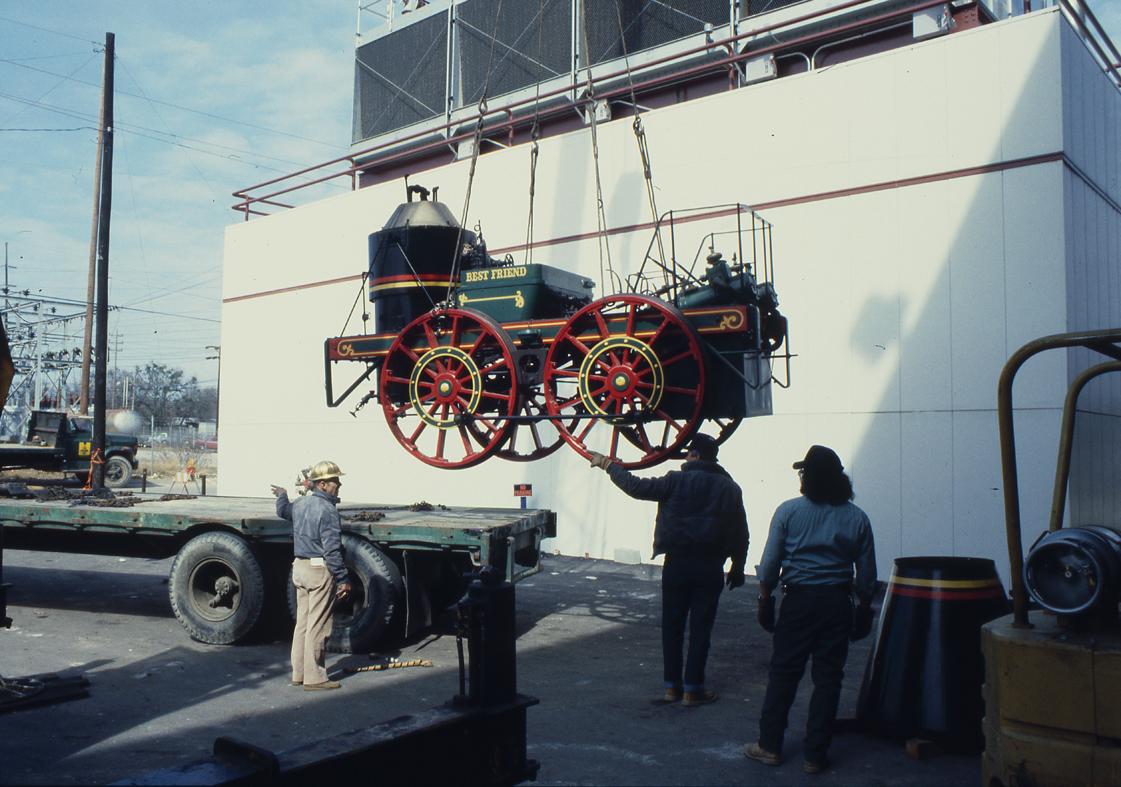
The museum is home to a wealth of astronomy resources and content for guests, educators, researchers and more.

Open today from 10:00 AM to 5:00 PM
Getting Here
Buy Tickets
Plan Your Visit

Homeschools
The State Museum welcomes South Carolina homeschool educators and students to visit and explore the museum for free.
The South Carolina State Museum offers the perfect destination for K-12 homeschool educators and students.
The museum offers four floors devoted to South Carolina history, art, natural history and science, plus planetarium shows and 4D theater films. South Carolina homeschool groups can enjoy:
• Free general admission for homeschool groups during regular operating hours* • Discounted rates for 4D theater and planetarium shows
* Free Homeschool general admission offer is valid for homeschool students and ONE adult, who is the designated teacher. Students and teachers must be officially registered with that particular homeschool.
Send an Email
Homeschool Admission
General Admission: FREE
Planetarium Show: $3
4D Theater Show: $3
General Admission: $5
General admission includes entrance to four floors of exhibition galleries and the Observatory. 4D theater and planetarium shows are an additional price, as noted.
Important Information
PLEASE NOTE: in order to receive homeschool benefits, all homeschools MUST present one of the following, along with a matching picture ID, when they visit the museum:
• An official and current homeschool association registration card or acceptance letter
• An official and current District registration card or approval letter
• An official and current SC Association of Independent Homeschools registration card or acceptance letter
Reminder, homeschoolers will NOT receive free museum general admission and/or discounted show tickets without presenting both a picture ID and confirmation of homeschool registration.

Educational Resources
The State Museum has a variety of resources for educators available from field trip to outreach and more.
- Skip to main content
- Keyboard shortcuts for audio player
Knock Knock, Teacher's Here: The Power Of Home Visits
Blake Farmer

Ninety percent of students at Hobgood Elementary in Murfreesboro, Tenn., come from low-income households. Most of the school's teachers don't. And that's a challenge, says principal Tammy Garrett.
"If you only know middle-class families, you may not understand at times why they don't have their homework or why they're tired," Garrett says.
When she became principal four years ago, Garrett decided to get her teachers out of their classrooms — and comfort zones — for an afternoon. Once a year, just before school starts, they board a pair of yellow buses and head for the neighborhoods and apartment complexes where Hobgood students live.
En route, the bus driver describes over the intercom how he picks up 50 children at one complex each morning. The teachers pump themselves up with a chant. After all, they're doing something most people don't enjoy: knocking on doors unannounced.
When the caravan arrives at a cluster of apartments, the teachers fan out and start knocking on doors of known Hobgood families. Some encounters don't get beyond awkward pleasantries and handing over fliers about first-of-the-year festivities. Others yield brief but substantive conversations with parents who might be strangers around school.
Jennifer Mathis has one child still at Hobgood and says she appreciates that the school came to her — since she has a hard time getting to school.
"I don't have a car. I can't drive because my back got broken in two places," she tells a trio of teachers standing in her doorway. "I'm a mom. I can't be there with all of them all the time."
Giving Home Visits A Try
There was a time when a teacher showing up on a student's doorstep meant something bad. But increasingly, home visits have become a tool to spark parental involvement. The National Education Association has encouraged more schools to try it out, and there's this national effort .
One district in Massachusetts just added money to pay teachers for the extra work involved. Traditional schools in Washington, D.C., tried out home visits after privately run charter schools used them to successfully engage parents.
In Murfreesboro, principal Garrett sees the brief visits as mutually beneficial. Parents get to meet their kids' teachers. And teachers get a clearer sense of the challenges many of their students struggle with on a daily basis.
"If a kid doesn't have a place to sleep or they have to share the couch with their siblings at night and there are nine kids with one bedroom or two bedrooms, it's important for them to see that — not to be sympathetic," she says. "It's to empower the teachers to change the lives of the kids."
It's serious business. But Danielle Hernandez, a special education teacher, says it's not the somber experience she'd feared. At one apartment complex, a dozen kids are out riding bikes on their last day of summer break.
"I know that these children, they go through a lot in their lives," Hernandez says. "But they get to have so much fun."
Teachers join in on that fun, borrowing kids' bikes for a cross-parking-lot drag race that generates howls from the adults.
Ashlee Barnes, a fourth-grade teacher at Hobgood, says she's a believer, even if home visits have yet to prove themselves as a difference-maker on standardized testing.
"We become more important in their lives than I think we can ever understand," she says. "I think the sooner you can start a relationship, you're going to see results on their performance in the classroom."
'It Makes Me Want To Cry'
The kids seem to genuinely enjoy the visits, even if they are a reminder that summer is over.
"I am so lucky," says fourth-grader Shelleah Stephens as she's introduced to Barnes, her new teacher. "All the teachers I have had have been so nice. It's great to see you."
Barnes hugs Shelleah, who is barefoot on the sidewalk in front of the unit where she lives with her father, Kenny Phillips. He's standing back, smiling as his daughter shows off her budding social skills.
"It just brings you this joy. It makes me want to cry," Phillips says.
Phillips runs a landscaping business and says long days have kept him from being as involved with his daughter's education as he'd like to be. Seeing this interaction has him a little choked up.
"It's just good to see her grow up and have people around her who care," he says. "Sometimes parents aren't there, man. Sometimes we gotta work. Sometimes we're gone a lot of the time. It's good to see [teachers] come out to the neighborhood like that. I know she's in good hands."
Phillips also grew up in Murfreesboro but says no teacher stopped by his house. He hopes to return the favor by making sure Shelleah finishes all her homework this year.
Home School Visits
Thank you for your interest in visiting the natural history museum of utah , home school families are invited to visit nhmu at a discounted price. please read through the details below and fill out the request form at the bottom of the page. , visit details .
- Tickets are not available for purchase at the Museum and must be reserved in advance.
- Ticket requests must be made at least 2 business days in advance.
- Tickets subject to approval for discount and availability
- Discount not available on festival weekends.
- Home School admission discount only available to families (no more than 10 people) through this form. Large home school groups, conglomerates or schools must book through the group field trip process. Request a group field trip here .
Interested in learning more about the new NHMU experience and prepare for your visit? Please visit our Plan a Visit to NHMU webpage .
To receive the discounted Home School Family admission rate, families must request tickets in advance through the form on this page. Home School admission rate only valid for families that are actively homeschooling their children, not for additional friends or relatives.
Questions? Email Us
Home School Visit Request Form
- Language Arts
- History & Geography
- Early Elementary
- Middle School
- High School
- Teaching Textbooks
- Encouragement
- Tips & Advice
- Planning & Organization
- Homeschool Life
- Thrifty Homeschool
- Snacks & Desserts
- Pregnancy, Birth & Babies
- Valentines Day
- Mother’s Day
- Father’s Day
- Thanksgiving
- Large Family
- Deals, Freebies, & Giveaways
- Privacy Policies & Disclosures
- Blog Series
- My Joy-Filled Homeschool
- Thrify Homeschool
My Joy-Filled Life
Inspiration for Your Home & Homeschool

Top 10 Historical Vacation Destinations for Homeschoolers
by Sarah 1 Comment

Best Places to Plan a Trip For Homeschool Education

Washington D.C.
Philadelphia, new york city.
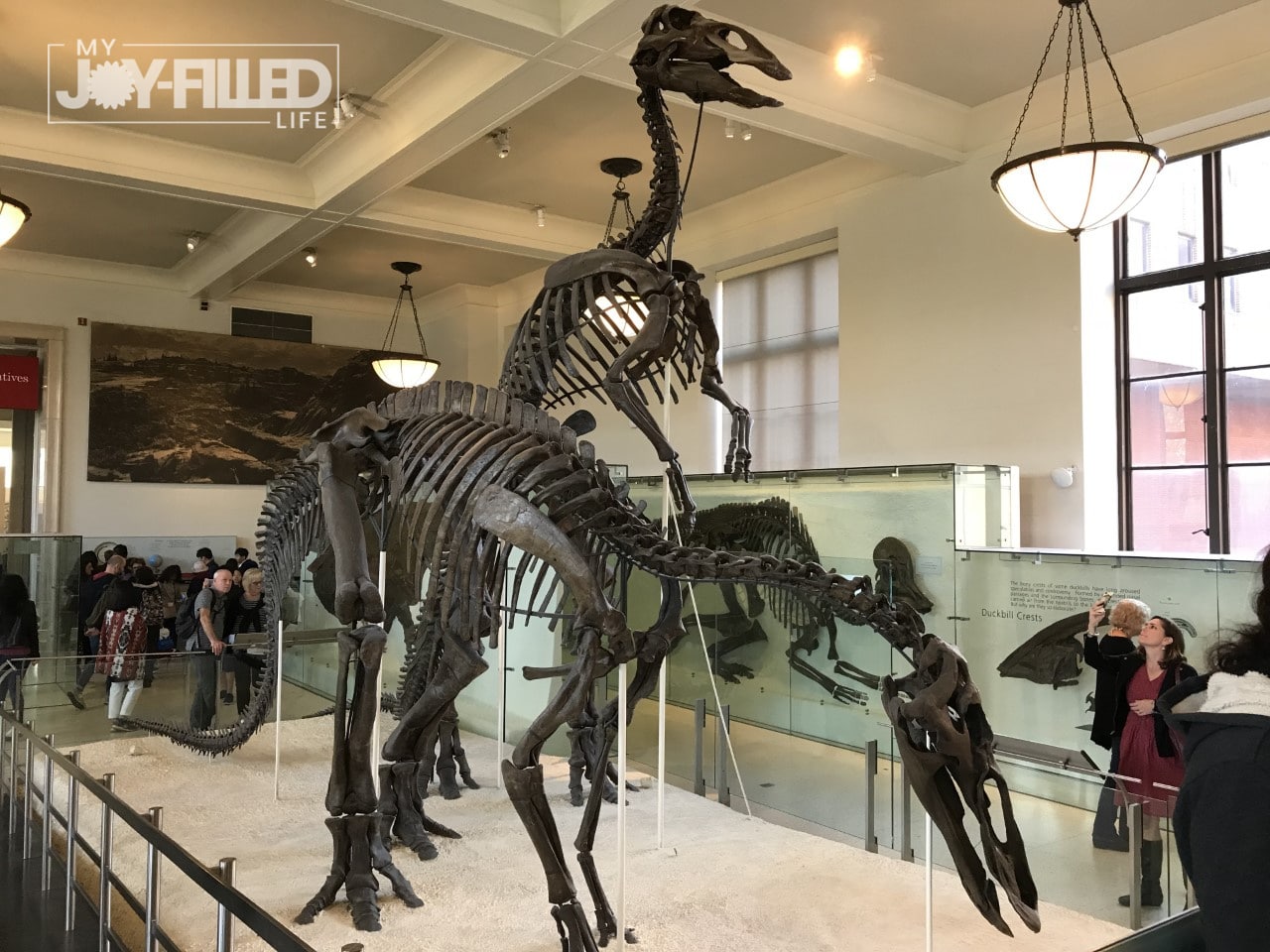
Historic Triangle of Virginia – Jamestown, Williamsburg, and Yorktown
St. augustine, fl, san antonio, tx.
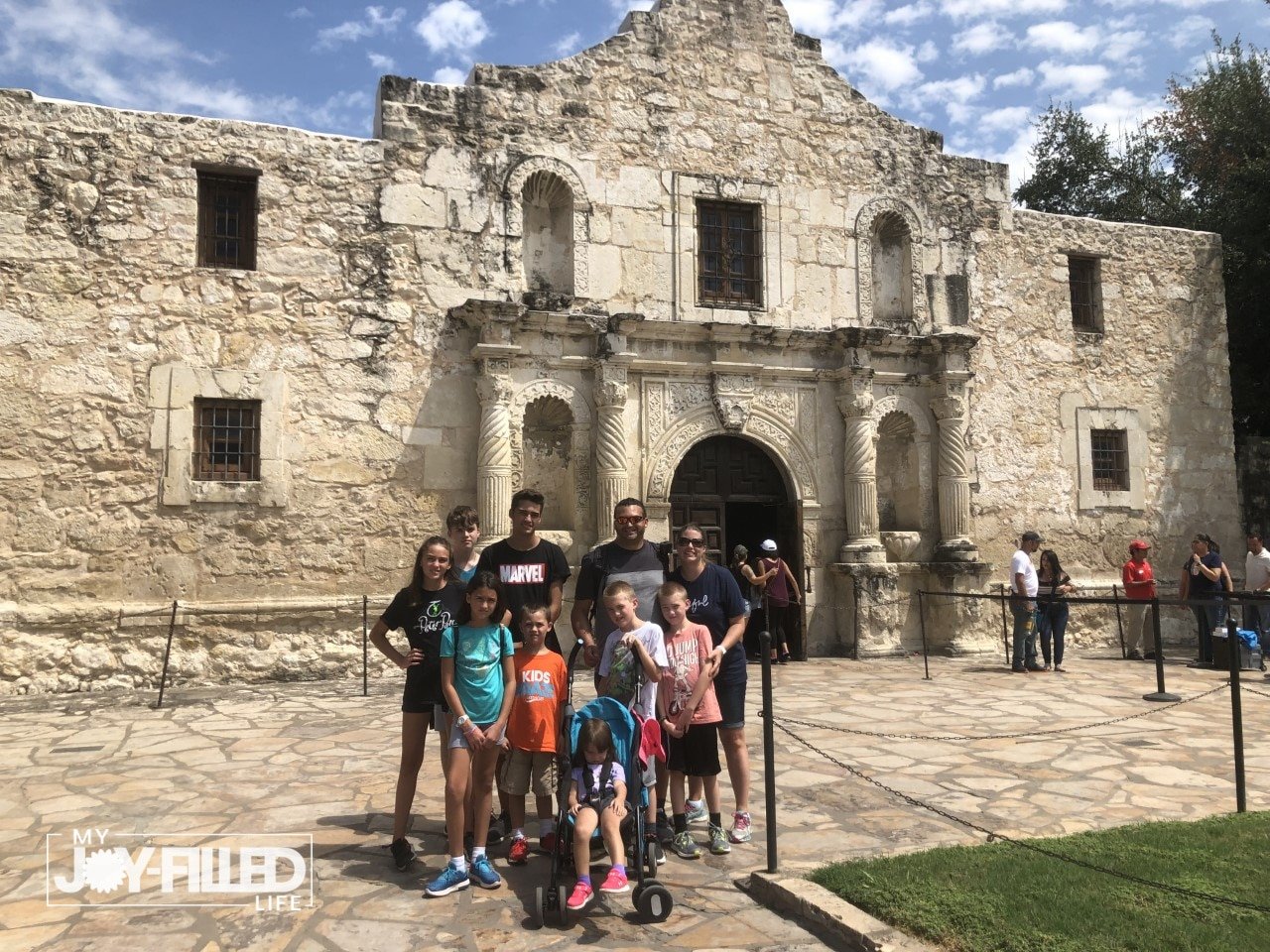
Charleston, SC
New mexico (specifically taos), road trip along the oregon trail.

subscribe for updates
All the latest recipes, homeschool tips, printables and more.

Hi! I'm Sarah.

The Edvocate
- Lynch Educational Consulting
- Dr. Lynch’s Personal Website
- Write For Us
- The Tech Edvocate Product Guide
- The Edvocate Podcast
- Terms and Conditions
- Privacy Policy
- Assistive Technology
- Best PreK-12 Schools in America
- Child Development
- Classroom Management
- Early Childhood
- EdTech & Innovation
- Education Leadership
- First Year Teachers
- Gifted and Talented Education
- Special Education
- Parental Involvement
- Policy & Reform
- Best Colleges and Universities
- Best College and University Programs
- HBCU’s
- Higher Education EdTech
- Higher Education
- International Education
- The Awards Process
- Finalists and Winners of The 2022 Tech Edvocate Awards
- Finalists and Winners of The 2021 Tech Edvocate Awards
- Finalists and Winners of The 2020 Tech Edvocate Awards
- Finalists and Winners of The 2019 Tech Edvocate Awards
- Finalists and Winners of The 2018 Tech Edvocate Awards
- Finalists and Winners of The 2017 Tech Edvocate Awards
- Award Seals
- GPA Calculator for College
- GPA Calculator for High School
- Cumulative GPA Calculator
- Grade Calculator
- Weighted Grade Calculator
- Final Grade Calculator
- The Tech Edvocate
- AI Powered Personal Tutor
College Minor: Everything You Need to Know
14 fascinating teacher interview questions for principals, tips for success if you have a master’s degree and can’t find a job, 14 ways young teachers can get that professional look, which teacher supplies are worth the splurge, 8 business books every teacher should read, conditional admission: everything you need to know, college majors: everything you need to know, 7 things principals can do to make a teacher observation valuable, 3 easy teacher outfits to tackle parent-teacher conferences, why home visits are critical to student success.
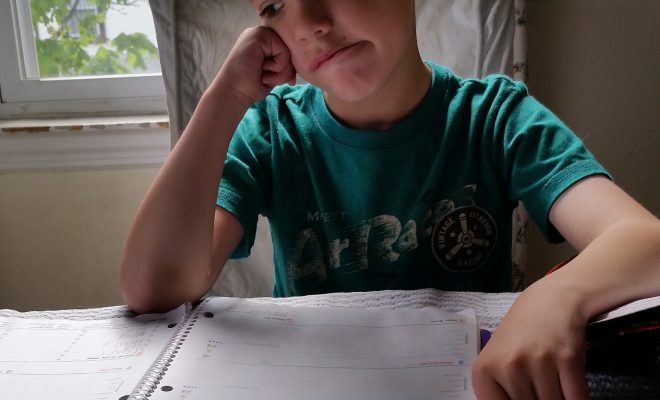
Very few teachers do not understand the importance of creating a partnership with parents to educate their students, but it can be difficult at times to establish contact with parents in this busy day and age. So, how can a teacher convey a sincere desire to work alongside parents to bring out the best in a student?
This where the home visit can be critical. Not only does a home visit allow a teacher to better understand a student’s home life and how it impacts school performance, but it has the potential to bridge any gaps in a culture that may be hindering a student.
California State at Sacramento did a study of fourteen schools whose teachers conducted home visits before the start of school. What they found was that the visits set the stage for reducing discipline issues, improving parental involvement, boosting positive feelings about school and improving student performance.
Benefits include:
- Forming close partnerships between parents and teachers.
- Sets the tone for positive communication during the school year.
- Reassures the student that the teacher cares about his/her welfare.
- Helps to bridge any cultural differences that may hinder learning.
Visit in the Home
The traditional visit has been for the teacher to set an appointment with the family before school starts. Often, more than one of the student’s teachers may visit at the same time, which has the advantage of making the visit as convenient for the parents as possible.
Because the visit is in the home, the parents, especially those from another culture, may feel less intimidated than meeting in a classroom. Many times it can lead the family to share the traditions that are important to them, helping the teacher to understand the student’s perspective better.
Visit on Neutral Ground
Some parents are not comfortable having a stranger in their home, so meeting at a fast food restaurant or a coffee shop can be an excellent alternative. One teacher from Washington, D.C., said, “These visits are the most direct way to get the parents’ help. We’re able to gain their trust. It makes the connection instant and so much deeper.”
Preparing for a positive home visit is essential for a teacher to establish a foundational relationship with parents from the beginning. Many schools compensate the teachers for the visits and provide training to create a successful visit.
Project Appleseed is a program aimed at improving public school involvement that ties in with home visits. They encourage schools to host an open house picnic in the first week of school for parents and anyone from the community. This allows the parents to see the school firsthand. The second week is a breakfast for families, students, teachers, and administrators to allow everyone to get to know one another better. The third week is an evaluation of how well the school is reaching out to parents. And, finally, the last week is an invitation to the parents to take the Appleseed pledge to volunteer 10 hours per week at the school and to read to their children for 15 minutes each day.
4 Keys to Finding and Using Technology ...
How school leaders can develop a grand ....
Matthew Lynch
Related articles more from author.

Tenure: Everything You Need to Know

Positive Reinforcement is Key Element in Preventative Behavior Management
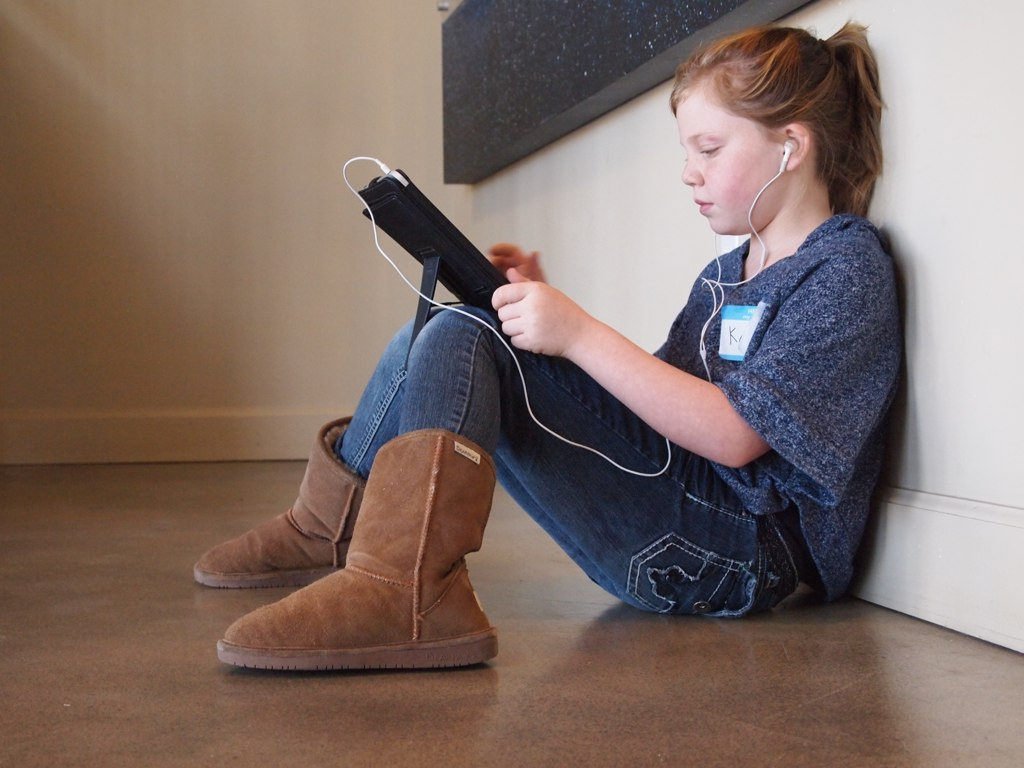
Discrimination in the Classroom: What You Need To Know About Students with Learning Disabilities

21 Ways to Help Students Who Care Too Much About What Others Think
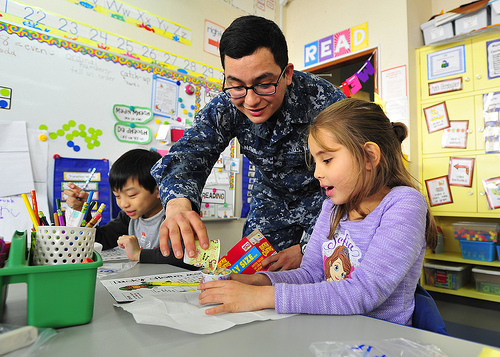
Driving questions to use in your PBL classroom
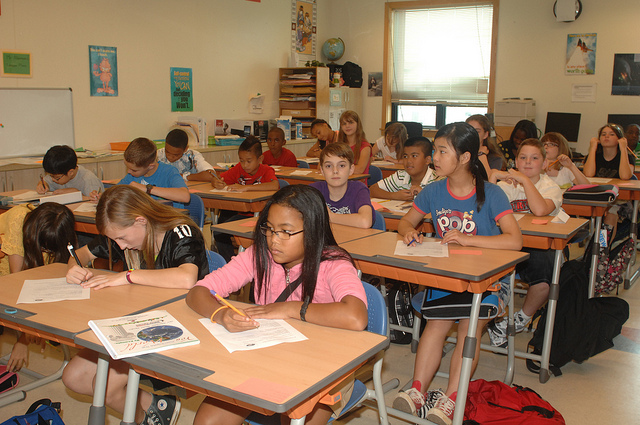
How to Implement Project-Based Learning into Your Classroom

Online Homeschool Program
For the fully accredited online school option, please visit AcellusAcademy.com

Included with Power Homeschool Subscription
Science LIVE with Acellus Creator Roger Billings
This weekly mentoring program encourages students of all ages to study hard and inspires a love for science. Using real-world examples, Roger Billings teaches students how to become “Inventioneers” who can turn breakthrough discoveries into useful inventions. Research shows that students who participate in this program improve academically and develop positive attitudes toward their schoolwork. Learn More
What’s New at Power Homeschool!
New courses.

Elementary Art
This course invites students on a captivating journey through the diverse world of art, delving into various artistic elements and styles. Read More

Introduction to Music Appreciation
This course takes students on an immersive journey through the world of music, spanning different historical periods and musical styles. Read More

High School English II
This course is designed to deepen students’ understanding and appreciation of literature while also developing communication skills. Read More
Enabling Tutoring Mode
You can enable Tutoring Mode on any of your student’s classes through the parent interface using the Acellus App. Read More
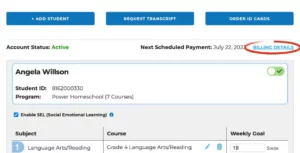
Enhanced Parent Account Interface
Several updates and enhancements have been added for Parents when managing their Power Homeschool Parent Account. Read More
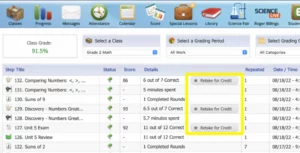
New Tutorial: Retake for Credit
Students are able to retake steps to revisit previous lessons and improve their score. This feature is available through the student account. Read More
New to Homeschooling
Have questions, ask the homeschooling experts – parents.

Power Homeschool In Action

Empowering the Prospers
The Prosper family currently lives in China, and have just recently started their homeschooling journey. After moving to a new school district, the Prospers began seeing differences in their family, particularly in their two boys Isaac and Simon. The Prospers took the...

Family Utilizes Power Homeschool to Navigate New Challenges
Amidst the backdrop of Lubbock, Texas, the Williams family embarked on a homeschooling journey with Power Homeschool during the pandemic. As challenges unfolded, particularly for Evie, who faced a daunting battle with a brain aneurysm, the program’s video-based learning emerged as a crucial source of support. Within their resilient homeschooling routine, therapy sessions seamlessly intertwined with learning opportunities, highlighting a transformative impact. Evie’s narrative stands as a testament to the effectiveness of homeschooling, revealing strength and resilience in the face of adversity.

The Benefits of Ongoing STEM Education
It's no secret that education is the stepping stone to a long and enriching career. However, offering your child a well-rounded education opens the door to a world of opportunities even beyond their future jobs — with the right knowledge, kids can grow into capable...
More Homeschooling Resources and Information

- Parent Guide to Getting Started with Homeschool
- j How to Prevent Homeschool Burnout
- 6 Tips for Transitioning from Homeschooling to College
- 5 Ways Homeschooling Can Help Children with Disabilities
- Why Homeschooling is on the Rise
Homeschool Links:
- Pros and Cons of Homeschooling
- Homeschooling Basics (101)
- Homeschooling Laws for all 50 States
- How do Homeschoolers Get Diplomas?


Home Visits: What Are They and Why Do We Do Them?
So, what exactly is a home visit? A home visit is basically a play date for the student and his teacher. The visit is an opportunity for your child to get to know his new teacher on his own turf, so to speak. In the coming weeks, if your child is new to our Toddler program, your child’s teacher will reach out to you and ask if you would like to have a home visit. The choice is entirely yours and you are not required to have a home visit. The home visit is simply one more tool for easing your child’s transition. The teacher will arrive and her focus will be establishing a bond between her and the child. She will allow the child to lead the visit, allowing him or her to select where they play and what they do together. She will stay for about 30-45 minutes. She may leave a small gift with the child or ask him or her to bring an item to school on the first day, such as a picture of his or her family. Overall, it is a casual time meant to introduce the child to his teacher and establish bonds of trust.
Now, you might be thinking won’t the teacher and my student have to bond eventually or why only for the Toddler students. Absolutely your child and his or her teacher will develop a special bond even without a home visit. But, home visits are an added resource for helping your child with this transition which is uniquely difficult for toddlers. An infant will not be able to connect a visit in August with the start of school a few weeks later and once their parent has left, infants are easily distractible. With infants, when the parent is out of sight, they are out of mind (don’t worry they still love you just the same!). Older children, also benefit from home visits, but they tend to still demonstrate separation anxiety because their displays are more about testing the parents’ reaction than genuine fear. Preschoolers and Elementary students that genuinely feel separation anxiety are able to communicate and comprehend reason at a higher level so teachers are able to engage them in the activities of the room to distract from the separation much faster and with more ease.
The toddler, on the other hand, is in a unique developmental limbo where he or she is capable of deep, complex emotions, but does not have the communication skills to express those feelings or the reasoning abilities to understand the explanations, the time frames, and the obligations that are associated with parents dropping and picking children up for school. A preschooler understands “I will pick you after nap,” (although they may not accept that). A toddler does not because they are rooted in the present. They have yet to understand that crying no longer satisfies their desires as it does for infants so. They want what they want and they want it now! Additionally, for toddlers, entering school may be the first time that they are away from Mom and Dad or a home environment for an extended period of time. As such, separation anxiety is often most difficult on toddlers, so we try to give you as many tools as possible to help minimize the stress for your entire family. Knowing your child is entering a classroom with a teacher who already has a sense of who he or she is and who is not a complete stranger, is not just a relief for the child, but for you as parents as well. We encourage to take this wonderful opportunity and make the most of it.
Here are some tips and items to keep in mind to make the most of your home visit:
- The visit is entirely about your child
- It is not a time of evaluation. The teacher is not evaluating your home, your family, your parenting, or anything at all. Similarly, it is not a time for you to evaluate the child or teacher
- It is not a conference between the parent and the teacher. While it will be tempting to ask questions about the program, discuss parental anxieties or point out your child’s capabilities, it is crucial that the child remain the focus of the visit. If you have such questions, let the teacher know and she will find another time when you can speak privately
- Naturally, parents have anxieties about a new phase in their child’s life and that is OK. However, the home visit (as well as in the first weeks of school), is not a time to show it. If you are anxious, your child will pick up on it, which will only reinforce and increase his or her anxieties. Remain positive and excited about school
- Do not stress about the visit. Do not run around cleaning the house or make elaborate snacks. Try to act as regularly as possible
- The act of inviting the teacher into your home is significant to the child. It unconsciously signals to the child that this is a safe person, a friend, and while a child cannot verbalize this feeling, you are establishing his or her sense of security with this teacher
- Allow the child to plan and lead the visit. It is important for your child to feel in control. He or she many plan to do one activity and then totally change his or her mind when the teacher arrives. This is ok. Go with your child’s flow.
- Don’t worry about planning an elaborate activity. Blocks, puzzles, games, and/or outdoor play are just fine. Again, allow your toddler to choose.
- Schedule the visit for a time your child is alert and happy. Avoid meal times, nap times, or too close to bedtime. A mid-morning or early afternoon visit, usually works best for a toddler
- Try to schedule the visit when other siblings are not present. If this is not possible, minimize sibling involvement as much as possible.
- Be respectful of the teacher’s time. Do not expect her to stay more than 45 minutes. She is conducting home visits for many students and many visits happen during her personal time
- In the event the home visit does not go well, don’t panic. Some children may not want to engage with the teacher or may get upset. Such a reaction is perfectly normal. Do not force the issue. Instead, have a quick, casual visit between the parents and the teacher. Seeing you have a friendly exchange is also beneficial. Just remember to keep it light!
- Most importantly, do not hover or attempt to interfere with the visit. Stay nearby so your child feels safe, but try to participate as little as possible. Preferably remain within an earshot, but out of sight. Take the opportunity to treat yourself to some quiet time!
Comments are closed here.
© 2024 Copyright The Springs Montessori School. All Rights Reserved. | Powered by Go Montessori
Lead Teacher
Ms. Mika comes to us with a wealth of experience and a deep passion for Montessori education. She earned her Early Childhood Credential from the American Montessori Society at the Northern Virginia Montessori Institute. Having started her journey with Montessori during her teen years, Ms. Mika has accumulated over ten years of experience in the field, with six of those years serving as a Lead Teacher
Her love for young children, coupled with her dedication to the Montessori philosophy, makes Ms. Mika an excellent addition to our team. In addition to her educational background, Ms. Mika is passionate about zoology, art, and music. She dedicates her free time to studying arthropods, particularly insects.
Ms. Brianna
Lead Teacher
For the past three years, Ms. Brianna has led toddler classrooms and has found this work to be deeply rewarding. The Montessori pedagogy and beliefs align closely with her teaching mission; to show children they are capable and to give knowledge that will last a lifetime. With a 0-3 Montessori certification and 8-plus years of experience working with children, she is so excited to continue educating young minds. In her free time, Ms. Bri enjoys reading, baking, drawing, and, most of all, making memories with her daughter, who will begin attending The Springs this summer.
Hailing originally from China, Ms. Miko’s journey led her to the United States in 2007 to pursue her studies in accounting at the University of Virginia. Her true passion has always been working with children. For several years, she dedicated herself to serving as a Mandarin interpreter, enriching the lives of others through language and culture. She began her Montessori journey in 2017 as an Infant Montessori Assistant and completed her Infant and Toddler certification in 2020. She has served as a lead Toddler Teacher for the last three years. Beyond her dedication to education, Ms. Miko finds fulfillment in her involvement with her church community. In her free time, she indulges in baking, skillfully crafting delicious creations that bring joy and warmth to those around her.
Ms. Elizabeth
Meet Ms. Elizabeth McCawley, our new Toddler Teacher in Classroom 2! Ms. Elizabeth hails from Barranquilla, Columbia, and has a Technical Degree in Merchandise Marketing from the Institute Tecnicor and has worked in retail for several years. However, her true passion has always remained with children and she loves working with toddlers because each day brings something new. She has been a Montessori Toddler Teacher for two years and has four years of experience working in a Montessori Classroom, both Children’s House and Toddler House. Ms. Elizabeth completed her 0-3 Montessori Diploma from the Prepared Montessorian and is thrilled to be joining The Springs! In her free time, she loves going out dancing, hiking, trying new foods, and visiting museums.
Bio coming soon…
Before and After School Coordinator & PE Teacher
Ms. Peggy was born in New York City and grew up in Queens. She is both a runner and a softball player, having played professionally for the New York Cheetahs. She also played for her college team while majoring in Physical Education.
At the start of her career, Ms. Peggy taught for Millbrook Central School District in New York, but she moved to the DC Metro area over twenty years ago and began working at a Montessori School as a PE Teacher. Ms. Peggy joined The Springs just about one month ago! She is excited to bring PE to all age groups at The Springs! She remains an avid runner, knitter, and voracious reader when she’s not teaching at our school! Ms. Peggy has three adult sons and five grandchildren who know her as Gigi.
Ms. Peggy is at the front desk during aftercare wishing everyone a great evening!
Mrs. Diana Glaukaj
Ms. Diana was born and raised in Albania! She came to the states as an au pair in 2007 for a family of four and completed her Bachelor’s Degree in Information Technology from George Mason simultaneously. Always loving children, Ms. Diana began in the Montessori world as a Children’s House Assistant in 2013 and eventually became an Assistant Head of School for another Montessori School in 2018. Ms. Diana is pursuing her Children’s House Montessori training from the Prepared Montessorian.
Ms. Diana enjoys travel, sports, music, and dancing in her free time and is a mom to her daughter, Jora.
Ms. Ayla Beg
Ms. Ayla was born in Turkey and came to the states at four years old. Settling in New Jersey upon arriving in the states, Ms. Ayla was a stay-at-home mom of four before moving to Virginia and joining a local Montessori school three years ago. Ms. Ayla has been with The Springs since July and loves saying hi to families, operating the phones, and making everyone feel welcome at the front door.
When Ms. Ayla is not greeting and organizing, she enjoys travel, shopping, walks and spending time with her three daughters and one son.
Ms. Elisa Zago
Ms. Elisa is originally from Italy and came to the US for the first time in 2019 as an au pair. Before embarking on this journey, she completed a Bachelor’s Degree in Linguistic and Cultural Mediation from the University of Padova and got a CELTA certificate from Cambridge University. She worked in customer service and communications for almost three years and has a certification in event planning and marketing. She loves languages and speaks Italian, English, Spanish, and French. Ms. Elisa has always loved children and used to lead children’s church programs in her hometown. She joined The Springs’ staff in January 2022 and manages the admission process, social media presence, and planning of school-wide events.
I completed the AMI Montessori Assistance to Infancy training in 2017 and am excited to join The Springs team. I also have a degree in Accounting.
I enjoy traveling, watching movies, exercising, and spending time with my two children in my free time.
Ms. Nikki joined THE SPRINGS in 2016 as an Infant House Assistant Teacher. She then moved to the Toddlers House the following year. She knew she was passionate about Montessori and wanted to be a Lead Teacher at The Springs. Ms.Nikki completed her AMS certification in 2020 and is now embarking on a new challenge as the Toddler House Lead Teacher.
Ms.Nikki has two children of her own who have also attended THE SPRINGS.
Ms.Nikki is excited to welcome each child as her own and is always willing to learn more every day.
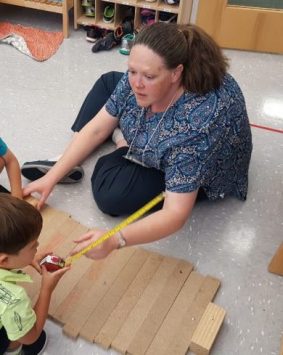
I am Ms. Beth, and I joined The Springs in 2014. I hold an AMI diploma from the Montessori Education Center of Arizona and a BS in Sociology from Presbyterian College. I started at a Montessori school in NC.
As a Montessori teacher, I enjoy seeing the children gain skills that will help them in life and carry over into their future. I enjoy teaching in all classroom areas, but the Sensorial area resonates with me, and I hope with the children too.
I enjoy reading, playing tennis, fishing, and spending time with my family.
My name is Deepa Sinha, and if you’ve been around the schools with children in the primary class, you may know me as Ms. Deepa. My teaching journey started when I started tutoring at the age of sixteen and soon realized that teaching was not only my work but my passion. I was introduced to Montessori when one of my kids entered the school, and I just fell in love with its philosophy.
I hold a Bachelor’s degree in Psychology, an American Montessori Society (AMS) Early Childhood Credential, AMS in Lower Elementary, and currently finishing up my AMS in Upper Elementary through CGMS. Additionally, I have extensive experience working as a behavior therapist for children with ADHD, autism, and dyslexia. I have been in the field of Montessori for the past 20 years and as a lead teacher for the last 16 years. I am starting my 6th year at THE SPRINGS. After four years of teaching Early Children House, I embarked on my new journey at THE SPRINGS as an Elementary Lead Teacher.
When I am not working at school, I am busy entertaining my huge extended family and friends with my love of cooking, working out, or hanging around with my family.
Ms. Mary hails from India, a country with a strong Montessori heritage, and has almost 20 years of teaching experience in the US. She has been a Montessori Infant Toddler teacher for nine years. She began her Montessori Infant Toddler career at The Boyd School. She then joined the Montessori School of Chantilly, where she helped start and grow their Infant Toddler program. Chantilly tapped her again to start a second Infant Toddler program upon opening their second school, Montessori School of Gainesville. She has a wealth of experience with the Toddler age group. Ms. Mary joined THE SPRINGS in September 2014 to launch our new Infant-Toddler Program.
Ms. Mary lives with her family in Chantilly. She completed her Montessori Infant and Toddler Certification at the Center for Montessori Teacher Education in North Carolina.

My first introduction to Montessori was in 2001, when I received my Montessori teaching credential from the Toronto Montessori Institute. I’ve continued to grow in my appreciation for teaching in the Montessori way and completed my Master’s Degree in Montessori Education from St. Catherine University in 2018. Language is my passion, and I enjoy opening up children’s curiosity through the perfectly sequenced language curriculum Dr. Montessori created.
I hope to continually inspire children to reach their potential by tapping into their unique strengths and interests, leading and inspiring future educators through my dedication to the practice of teaching. I enjoy traveling, listening to music, and eating delicious food. I am an aspiring writer and am working on finishing my novel in my free time.

Ms. Bianca came to us from Cardinal Montessori in Woodbridge. She was a Lead Lower Elementary Teacher for four years but has been at Cardinal Montessori for the past 15 years. Ms. Bianca has a Bachelor’s Degree in Sociology with a focus in Education and Family Studies from the University of Mary Washington. Ms. Bianca received her Lower Elementary Certification from The Institute for Advanced Montessori Studies.
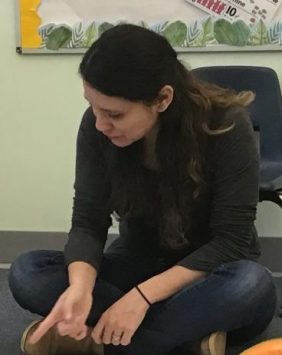
Ms. Fernanda

Ms. Savannah
Ms. Savannah has a Bachelor’s degree in Psychology from Centre College in Danville, Kentucky. In addition, she has her American Montessori International (AMI) Primary credential from the Montessori Institute of North Texas in Dallas, Texas. From infancy to 5th grade, Ms. Savannah was a Montessori child at Montessori of Roseborough, where she grew up in Mount Dora, Florida. Before solidifying her passion for Montessori pedagogy, Ms. Savannah worked as a toddler assistant in Nashville, Tennessee. She will obtain her Master’s in Education with a concentration in Montessori Education from the University of Hartford this Fall.
Ms. Savannah is beyond excited about what this new year at The Springs has in store for her!
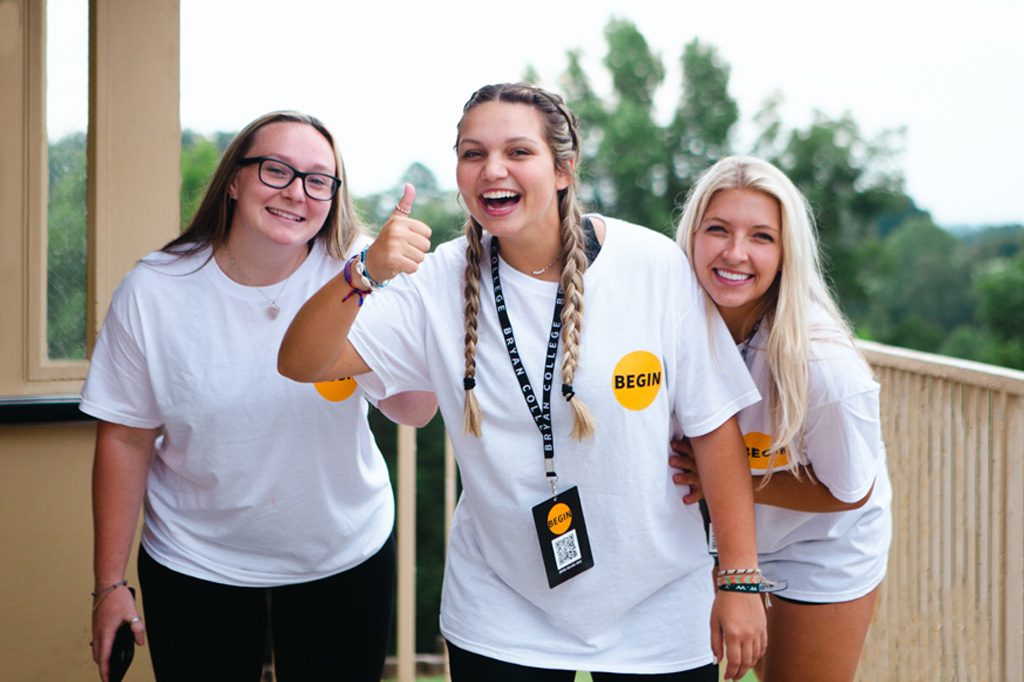
- Get to Know Bryan
- Accreditations
- Strategic Plan
- Offices & Services
- Campus Maps
- Consumer Information
- Terms of Use
- On The Hill Podcast
Contact Giving
Christ above all
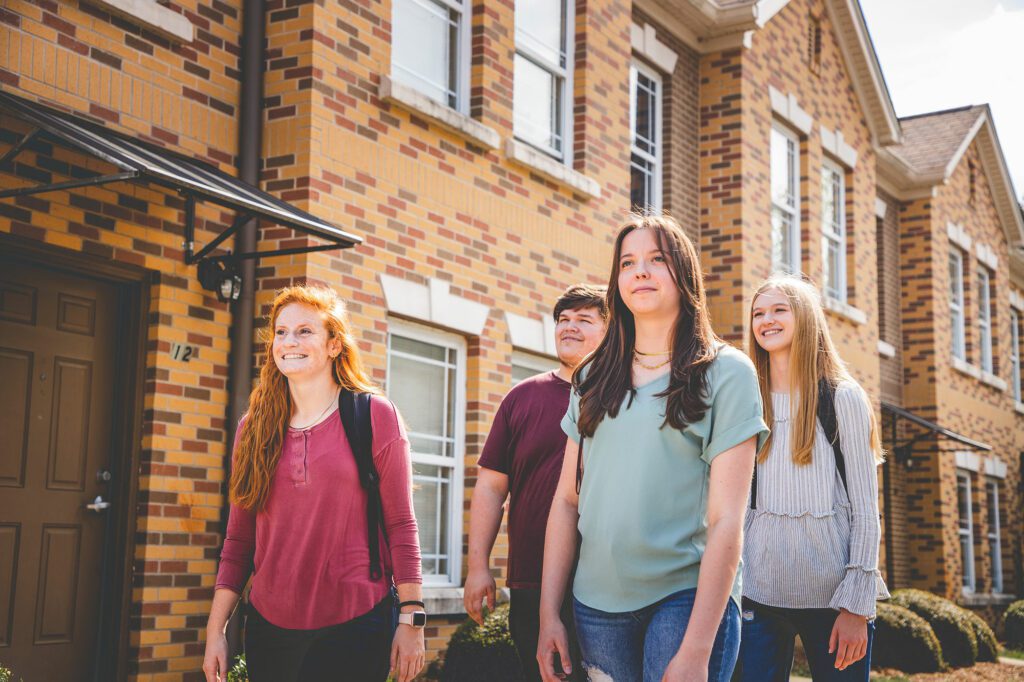
- The Admissions Process
- Tuition & Fees
- Financial Aid
- Scholarships & Grants
- Dual Enrollment
- Admissions Counselors
- Military, Veteran Services & First Responders
- Homeschool Admissions
- Industry Partnerships
- Summer Institute
- Documents & Forms
Apply Now Virtual Tour Schedule a Visit
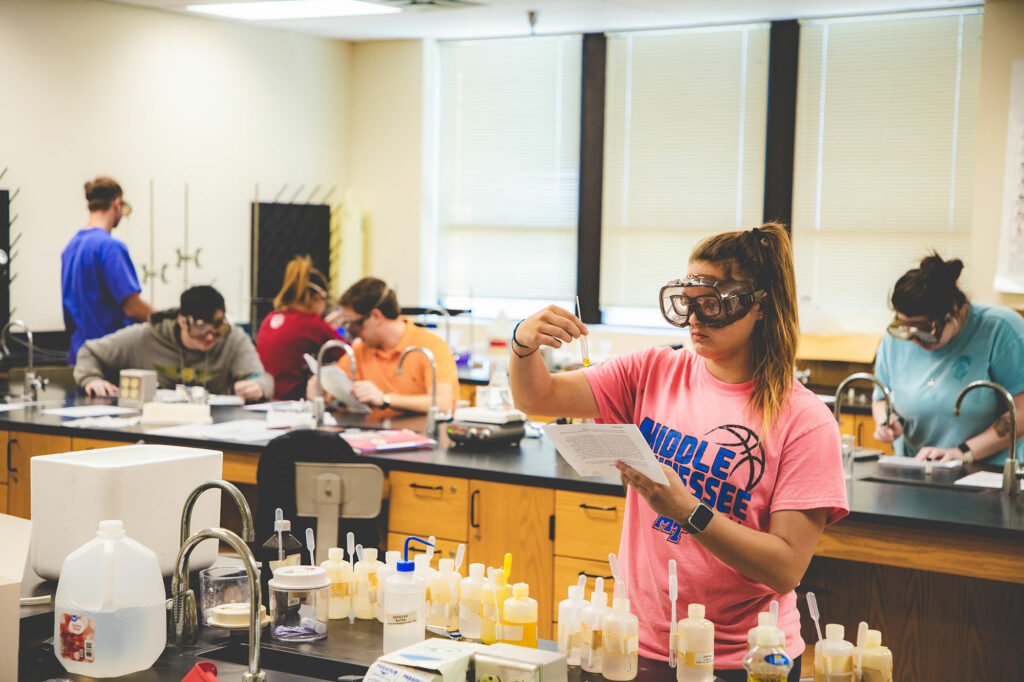
- Academics at Bryan
- Undergraduate Programs
- Graduate Programs
- Doctorate Programs
- Dual Enrollment Program
- BC Online Programs
- Academic Calendars
- Catalog [PDF]
- Degree Plans (Residential Undergraduate)
- Student Resources
- Academic Resource Center
- Registrar & Transcripts
- Commencement
Find Your Degree Find a Professor Apply Now
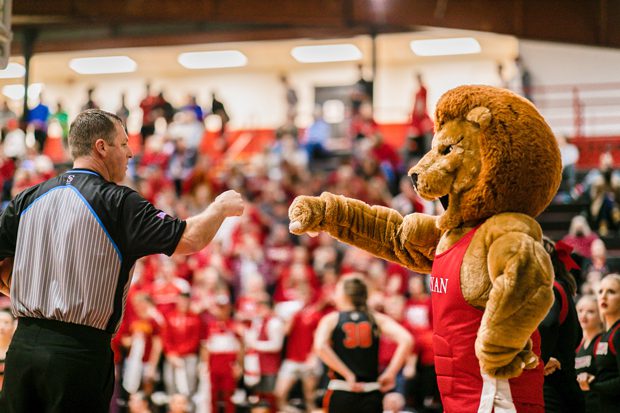
- Bryan Athletics
- Athletics Staff
- Teams, Players & Stats
- Athletic Schedule
- Intramural Sports
Contact a Coach Bryan Lions Shop Lions Gear
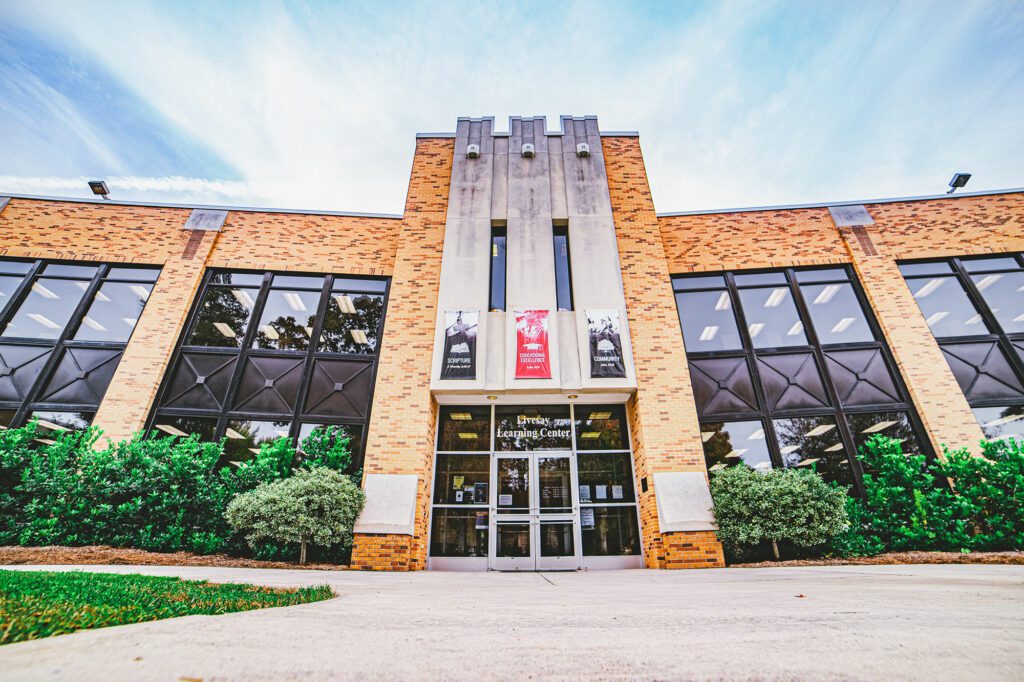
- Life at Bryan
- Engagement & Activities
- Christian Formation
- Campus Calendar
- Concerts & Productions
- Residence Life
- Campus Services
Visitor Info Student Info Employment
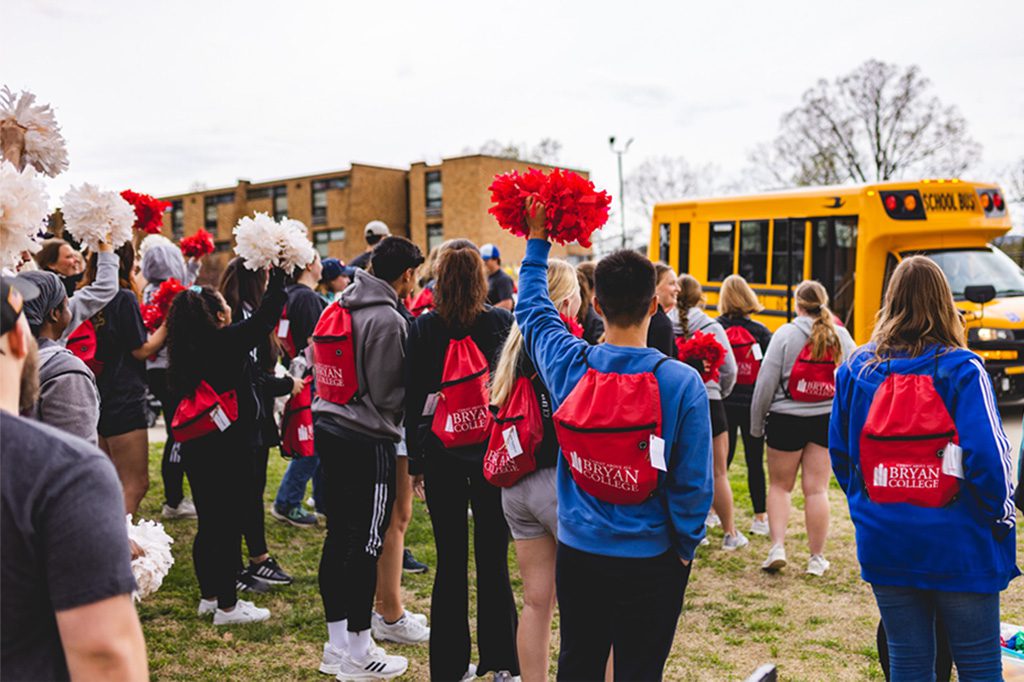
- Community at Bryan
- Outreach Ministries
- Performing Arts Academy
- Speakers of Bryan
- High School Experiences
- Area Accommodations
- Dining Services
- Advancement
- Design & Marketing
- Event Services
- Advisory Boards
Events Visitor Info Employment
- Homeschool Visit Day
Generating PDF...
Please wait...
- Payment Center
- Enrollment Deposit
- Pay Testing Fees
- Pay Club Fees
- Federal & State Aid
- Tuition Statement (1098-T)
- Net Price Calculator
- Financial Aid Resources
- Outside Scholarships
- Dual Enrollment Partners
- Dual Enrollment Visit Day
- Dual Enrollment Course Registration
- Homeschool Resources
- Preview Day Registration
- Application Essay
- Internal Transition Application
- Applicant Reference Form
- Submit Your References
- General Education Mobile (GEM) Program
Homeschool Visit Day Registration
Homeschool Visit Day is an opportunity for students and Co-Ops to experience Bryan College on a firsthand basis. Students will have the chance to attend class with our professors, eat in the Latimer Student Center, and truly get a behind the scene look at being a Lion. This event will begin at 9:00 and end at 2:00. A Scopes Trial live presentation will follow at the Historic Downtown Rhea County Courthouse at 2:30. This presentation will last approximately 45 minutes.
September 25, 2023
721 Bryan Drive, Dayton, TN 37321
423-775-2041 Social Media Directory
1-800-277-9522
Public safety, 1-800-987-6543, information, campus links.
Bryan College is a small, regionally accredited Christian liberal arts college located in Dayton, TN. With both on-campus and online programs, more than 50 areas of study are offered for Associate’s, Bachelor’s, Master’s, and Doctorate degrees, as well as professional certificates.
Founded in 1930, Bryan College has a rich legacy of educating students to become servants of Christ and make a difference in today’s world.
© 2024 BRYAN COLLEGE

IMAGES
VIDEO
COMMENTS
Homeschool Programs and Resources. Self-Guided Groups. Homeschool groups are welcome to tour the museum independently. For homeschool groups of 15 participants or more, please complete the self-guided group form least four weeks prior to your visit. This helps museum staff prevent overcrowding in the galleries.
Excluding other members of the family from the visit. Talking about families in public. Being the center of attention. 6. Project Appleseed: The National Campaign For School Improvement. Project Appleseed is actually an entire model (with paid training but also free tips and resources) for school home visits.
Home Visits 101. Home visits can be a valuable tool for increasing parents' involvement in their kids' education. Here's how you can get started. Teachers often find themselves wondering why their efforts at organizing opportunities for parents to become more involved in classroom activities do not pan out. They send written reminders ...
Biology field trip ideas: a butterfly vivarium, an Audubon Center, a wolf preserve. Chemistry field trip ideas: a manufacturing laboratory, a college research lab, fire department, wastewater treatment plant. 2. Look for specific locations. Head to Google and input your desired type of field trip.
Learn & Grow. We believe every child is unique, that children should learn in ways that meet their needs, and that you want the best for your child. Homeschooling gives you the freedom to personalize their education so they can realize their potential. HSLDA passionately advocates for the freedom to homeschool and offers support for every stage ...
Homeschool Third Thursday. Join us for a FREE hands-on learning program, designed for homeschool families and small groups. Families will explore the museum, and learn about works of art, and how art connects to other subject areas. Each program is accompanied by background information for the adults, discussion questions to ponder over as a ...
Designed to accommodate individual students or small groups with less than 15 students. Students will not be visible to the museum educator or other students, but they will be able submit questions in writing through the Q&A, and interact through polls. Homeschool Days are available the first Monday of the month, April 1, May 6, and June 3, 2024.
Seeking Home-School Partnership. To make home visits manageable, I only visited the homes of the four to five ninth graders who were new to my advisory class. The first year I did this, there was a lot of pushback from students who weren't used to having a teacher visit their home, but in the second year, the tenth graders were able to sell the ...
Visit a nearby farm. Go apple or blueberry picking at an orchard. Take a car trip on a scenic road (and maybe listen to an audiobook!) Get involved in a community garden. Visit a greenhouse or botanical garden. In fall or winter, visit a pumpkin patch or a Christmas tree farm. Visit an observatory or planetarium.
The museum is the perfect destination for K-12 homeschool educators and students with four floors devoted to South Carolina history, art, ... The State Museum welcomes South Carolina homeschool educators and students to visit and explore the museum for free. Museum Hours. Open today from 10:00 AM to 5:00 PM.
Getting Started Homeschool Guide. Learning How to Homeschool is something you can do! We're so excited you've chosen to homeschool. And we're here to make sure you have everything you need to accomplish that goal. We've tried to summarize the homeschool journey into six simple steps. In each step, we'll give you the information and ...
But increasingly, home visits are being used to spark parental involvement. nprEd HOW LEARNING HAPPENS. K-12. Knock Knock, Teacher's Here: The Power Of Home Visits. August 26, 2015 2:03 PM ET.
Visit Details. Tickets are not available for purchase at the Museum and must be reserved in advance. Ticket requests must be made at least 2 business days in advance. Discount not available on festival weekends. Home School admission discount only available to families (no more than 10 people) through this form.
It depends! Homeschooling is personalized to each child and each family, so homeschool budgets can vary. If you have the time and flexibility to borrow curriculum, use the library, shop for used books, find reusable, multilevel, or free curriculum, and exchange services for extracurriculars like music and art, you might pare your costs down to $50-100 per student.
HOME VISIT GUIDE Pupil Services and Attendance staff are often expected to do home visits as a part of their work with students and families. Home visits are a powerful way to connect with students and parents who may be alienated from their school, or be struggling with issues that are preventing them from attending. ...
The streets of St. Augustine are loaded with history. This is because this is the oldest city in Florida AND the oldest city in the entire United States. Knowing that this town was founded in the 1500s is certain to be full of history and charm. Visit the González-Alvarez House, which is the oldest house in the town.
Reassures the student that the teacher cares about his/her welfare. Helps to bridge any cultural differences that may hinder learning. Visit in the Home. The traditional visit has been for the teacher to set an appointment with the family before school starts. Often, more than one of the student's teachers may visit at the same time, which ...
Phase 1: Before the Visit. Inquire about administrative policy on home visits. Find school or community assistance with translation of documents or phone calls. Send letters home with all students describing purpose of home visits. Talk to students and parents about home visits in person when informal occasions arise.
In a parent-guided homeschool program, parents provide the role of the teacher. It is your duty to motivate your students and to make certain that they spend the time necessary to stay current in their studies. If you are looking for a fully accredited online school program, please visit AcellusAcademy.com. Learn More.
A home visit is basically a play date for the student and his teacher. The visit is an opportunity for your child to get to know his new teacher on his own turf, so to speak. In the coming weeks, if your child is new to our Toddler program, your child's teacher will reach out to you and ask if you would like to have a home visit. The choice ...
attendance. Home visits are a powerful way to connect with students and parents who may be alienated from their school or struggling with issues that are preventing them from attending. Home visits allow the opportunity to educate parents/caregivers about California Compulsory Education Laws. Preparation:
Home visits have been increasingly advanced as a strategy to strengthen rela-tionships between parents, their children, and the teacher; therefore, this study . explored the potential of home visits to positively impact teacher and parent . relationships and student outcomes at a diverse, urban high school. Theoretical Framework
Homeschool Visit Day is an opportunity for students and Co-Ops to experience Bryan College on a firsthand basis. Students will have the chance to attend class with our professors, eat in the Latimer Student Center, and truly get a behind the scene look at being a Lion. This event will begin at 9:00 and end at 2:00. A Scopes Trial live ...